

The COURIER
Pilgrimages of HoPe
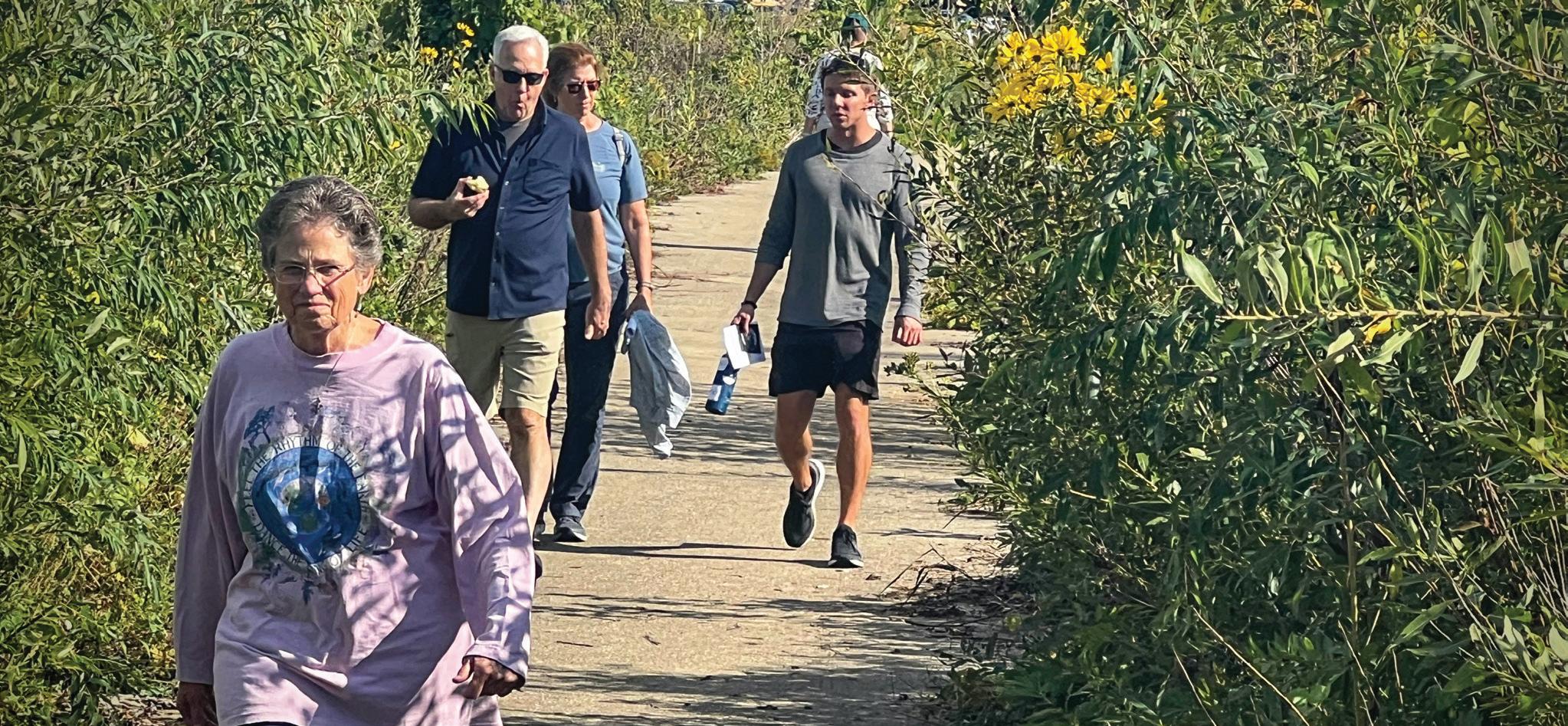
Submitted by MARY VLAZNY
�n this Jubilee Year of Hope, the Laudato Si Movement Minnesota Chapter is promoting Pilgrimages of Hope for Creation across Minnesota. Pilgrimages of Hope for Creation is a faith-filled movement launched by a broad coalition of U.S. Catholic organizations. It is meant to encourage U.S. Catholics to embark on local pilgrimages during the 2025 Jubilee Year, to pray for the grace to encounter Christ in creation, and restore our relationships with God, creation, and one another. The initiative is rooted in Pope Francis’ Laudato
Si', which underscores the importance of caring for the earth as a moral responsibility, the principles of Catholic Social Teaching, and the teachings of St. Francis of Assisi.
Why Are Pilgrimages of Hope for Creation Happening in 2025?
The year 2025 marks both the 800th anniversary of St. Francis of Assisi’s Canticle of the Creatures and the 10th anniversary of Pope Francis’ groundbreaking encyclical Laudato Si’. To mark this pivotal year,
Pilgrimages of Hope, cont'd on pg. 6
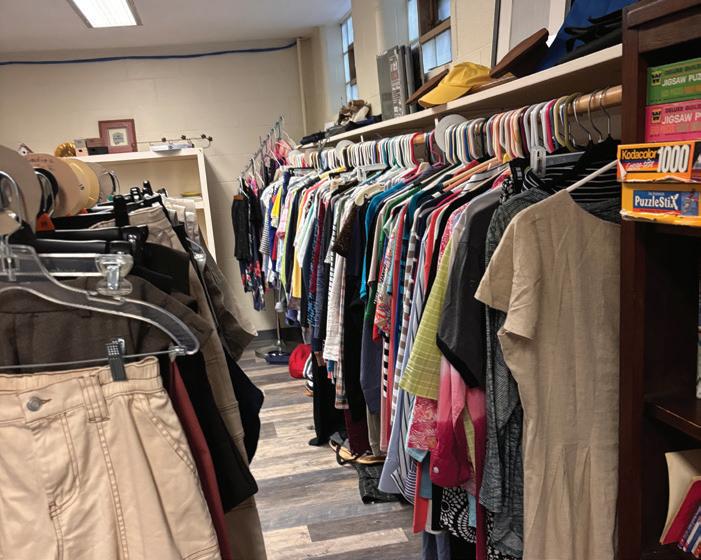
Implementing the Diocesan Synod
By BRIAN KUSEK
�
ecently, our diocese celebrated its second Synod, a historic opportunity for the faithful to come together and to invite the Holy Spirit to direct us in discerning the pastoral needs and concerns for the local Church, in order to advise the Bishop in the exercise of his apostolic ministry. It was a wonderfully prayerful event, in which 226 participants discerned, through constructive dialogue, the good of all those in Southern Minnesota. Many themes were discussed in relation to evangelization and vocations: beauty, reverence, social justice, the importance of institutions, technological advances, and support for the domestic church. There were plenty of divergences, to be sure, but not nearly as many as one might expect for such a diverse assembly. All conversations were had with a spirit of mutual respect and Christian charity. The key was to lay aside our personal projects and biases and to trust in the direction of the Holy Spirit. It was a beautiful example of the “style” or “attitude” for fostering church communion and participation that Pope Leo has so often described, all oriented at proclaiming a more credible witness to the world.
In the end, participants voted on 30 proposals related to evangelization and vocations. These
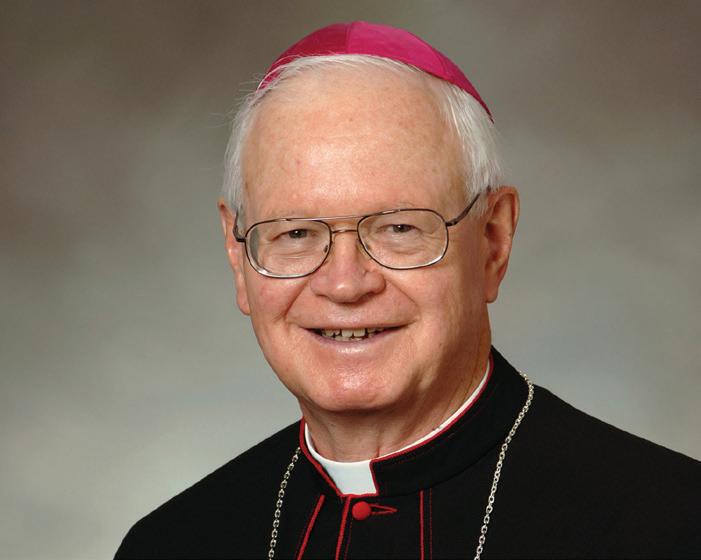
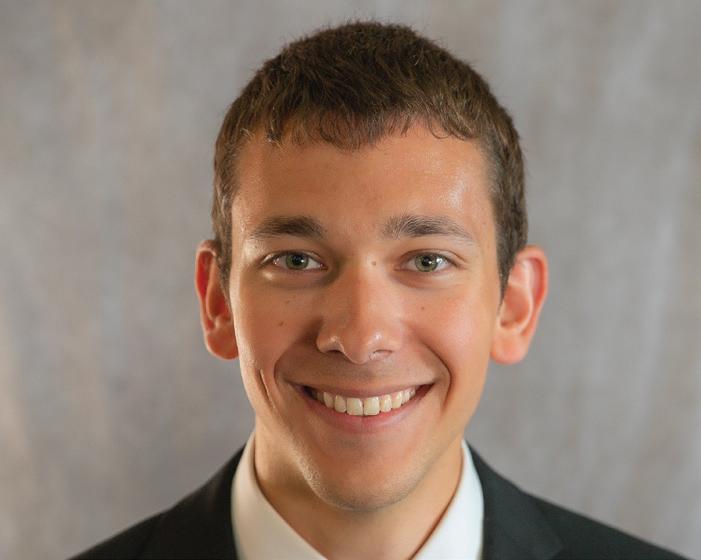
Synod,
Participants walk on the Pilgrimage of Hope for Creation that began and ended at Cascade Meadows in Rochester on September 20, one of numerous such pilgrimages taking place in the Diocese of Winona-Rochester this fall.
The Courier Insider
In Interview, Pope Discusses Abuse Crisis, Trump, Following Pope Francis
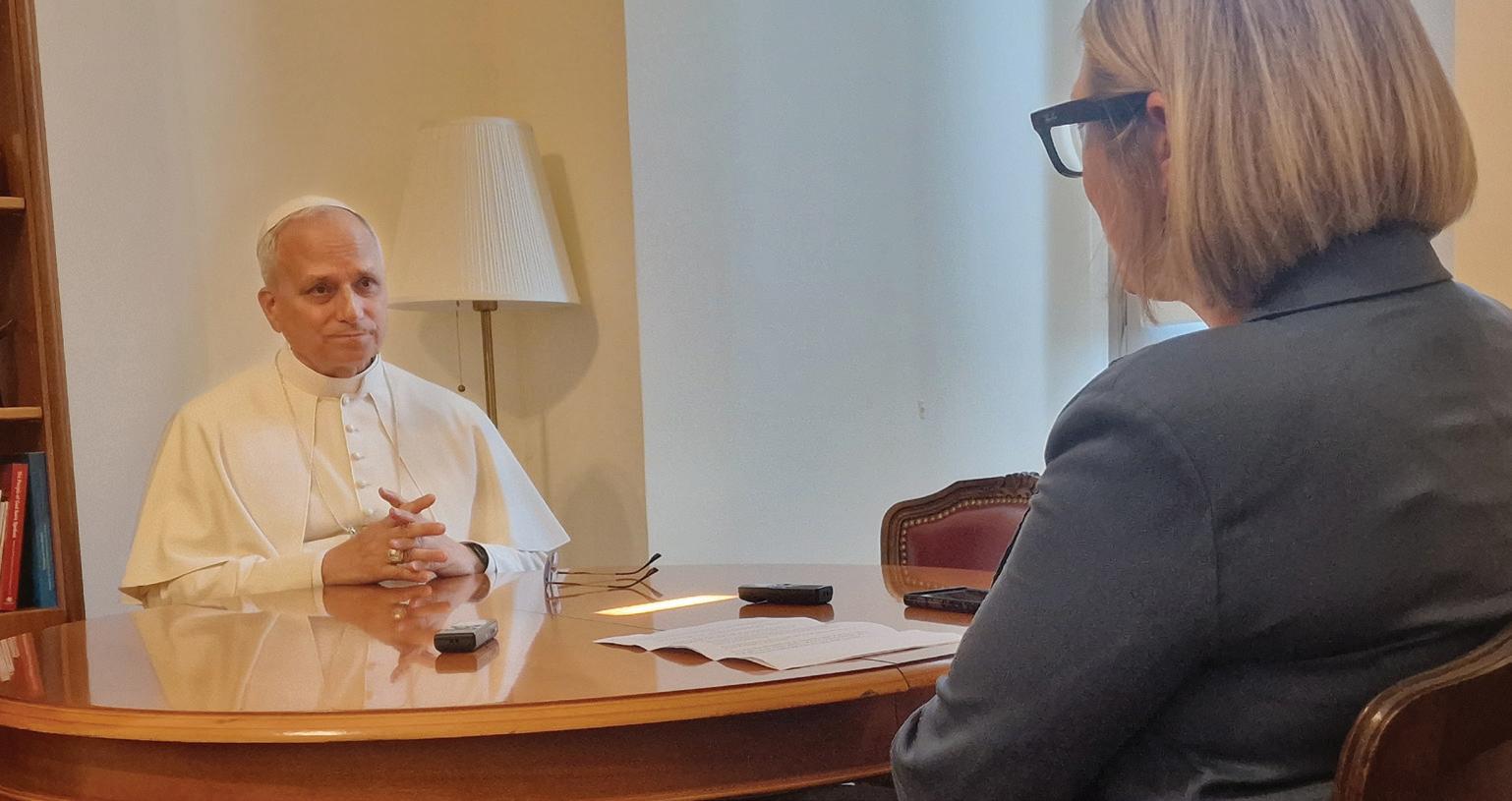
By CINDY WOODEN, Catholic News Service
VATICAN CITY, Sept. 18, 2025 (CNS)Clerical sexual abuse continues to be "a real crisis," one that the Catholic Church still must learn to deal with, particularly in improving the way it helps survivors while also ensuring the rights of the accused are respected, Pope Leo XIV said.
"It would be naive for myself or for anyone" to think that dismissing the offender and giving the victim a financial settlement completely solves a case, "as if those wounds are just going to go away because of that," the pope said in an interview for a book by Elise Allen, a journalist.
For Allen's biography, Leo XIV: Citizen of the World, Missionary of the XXI Century, Pope Leo spoke about a range of issues, including the abuse crisis, U.S. President Donald Trump, the war in Gaza, Vatican policy toward China, the church's openness to LGBTQ Catholics, the role of women in the church, and the celebration of the pre-Vatican II Mass in Latin.
Excerpts of Allen's July 30 interview, her second interview with the pope, were published Sept. 14, but the full transcript was released Sept. 18 in conjunction with the publication of the Spanish edition of the book by Penguin Peru.
Pope Leo said that while the church has enacted tougher laws and policies to prevent and punish abuse, it cannot say that the crisis is over.
"This will continue to take time because victims must be treated with great respect and with an understanding that those who have suffered very deep wounds because of abuse sometimes carry those wounds for their entire life," he said.
At the same time, he said, there is the "complicating factor" of ensuring that the rights of the
The
of
2907 Jeremiah Lane NW, Rochester, MN, 55901 Vol 116 - 10
accused are respected.
"Statistics show that well over 90% of people who come forward and make accusations, they are authentically victims. They are telling the truth. They are not making this up," he said. "But there have also been proven cases of some kind of false accusation. There have been priests whose lives have been destroyed because of that."
And even when the accusation is well founded, the pope said, the accused has a right to a presumption of innocence and due process.
"But even saying that at times is cause of greater pain for the victims," Pope Leo acknowledged.
On the topic of President Trump, Pope Leo said he had not met the president nor spoken to him, although his brother Louis has and "has been very outspoken about his political views."
Trump "at times has made clear" his concern about questions of human dignity and promoting peace, the pope said. "In those efforts I would want to support him."
"The United States is a power player on the world level, we have to recognize that," he said, but "sometimes decisions are made more based on economics than on human dignity," such as the current immigration policy, and the church will continue to challenge that approach.
Pope Leo declined to get into "some of the things that have been said about the episcopacy in the United States and the relationship between church and politics." However, he said, "the fact that I am American means, among other things, people can't say, like they did about Francis, 'He doesn't understand the United States; he just doesn't see what's going on.'"
Regarding the war in Gaza, Pope Leo told Allen that "the word genocide is being thrown around more and more. Officially, the Holy See does not
Most Reverend Robert E. Barron, Publisher Nick Reller, Associate Editor
Telephone: 507-361-3068 E-mail: nreller@dowr.org
Publishing Schedule: Monthly - Deadline for advertising & articles is the 10th of the month prior. (ISSN 0744-5490)
• Hard copies are distributed at DOW-R parishes on the first or second weekend of each month.
• An online version may be viewed at www.dowr.org/offices/courier/index.html
• To be added to the home delivery list free of charge, readers should send their names and addresses to:
Diocese of Winona-Rochester The Courier 2907 Jeremiah Lane NW Rochester, MN 55901 or nreller@dowr.org
believe that we can make any declaration at this time about that. There's a very technical definition about what genocide might be, but more and more people are raising the issue, including two human rights groups in Israel."
On China, and most of the other issues the pope discussed in the interview, he said he would follow the basic path laid out by Pope Francis.
"I in no way pretend to be wiser or more experienced than all those who have come before me," Pope Leo said.
However, before becoming pope he made several visits to China, and Pope Leo said he is "in ongoing dialogue with a number of people, Chinese, on both
Child Abuse Policy Information
The Diocese of Winona-Rochester will provide a prompt, appropriate and compassionate response to reporters of sexual abuse of a child by any diocesan agent (employees, volunteers, vendors, religious or clergy). Anyone wishing to make a report of an allegation of sexual abuse should call the Victim Assistance Coordinator at 507-454-2270, Extension 255. A caller will be asked to provide his or her name and telephone number. Individuals are also encouraged to take their reports directly to civil authorities. The Diocese of Winona-Rochester is committed to protecting children, young people and other vulnerable people in our schools, parishes and ministries. The diocesan policy is available on the diocesan web site at www.dow.org under the Safe Environment Program. If you have any questions about the Diocese of Winona-Rochester’s implementation of the Charter for the Protection of Children and Young People, please contact Michael Gerard at 507-361-3377, or mgerard@dowr.org.
Courier is the official publication of the Diocese
Winona-Rochester
Where to Find The Courier
Pope Leo XIV is interviewed by Elise Allen, senior correspondent at Crux, at the Vatican on July 30, 2025. (CNS photo / courtesy Crux)
October Saint
St. Mary Salome
Feast Day: October 22 3
From Catholic News Agency
�ike the Jewish greeting "Shalom" and the Arab "Salaam," Salome is based on an Aramaic word meaning health and peace. It would be hard to think of a more fitting name for a mother.
It is quite probable that Salome was the sister of the Blessed Virgin, and it is certain that she was the wife of Zebedee and the mother of James the Greater and John the Evangelist (Matthew 20:20; 27:56). In the Gospel of St. Matthew (20:20ff) it is written:

The Holy Father's Intention for October 2025
For Collaboration Between Different Religious Traditions
Let us pray that believers in different religious traditions might work together to defend and promote peace, justice, and human fraternity.
Then the mother of the sons of Zebedee approached him with her sons and did him homage, wishing to ask him for something. He said to her, "What do you wish?" She answered him, "Command that these two sons of mine sit, one at your right and the other at your left, in your kingdom."
Salome was one of the women who followed Jesus and served him (Mark 15:41), witnessed his crucifixion and death at Calvary (Matt. 27:56; Mark 15:40), and who brought spices to embalm him on Easter morning (Mark 16:1ff). Legend says that, after the Resurrection, she went to Veroli, Italy, and spent the rest of her life there spreading the Good News.
In art, Mary Salome is shown with her two sainted children (James and John) in her arms. Occasionally Mary Salome is present at the Nativity because there is a legend that the doubting Salome was a midwife, who came, unbelieving, to the stable at Bethlehem and was converted (cf. Jameson, Legends of the Madonna). Sometimes Mary Salome together with Mary Cleophas support the Virgin at the Crucifixion or they are present with Mary Magdalene at the Resurrection.
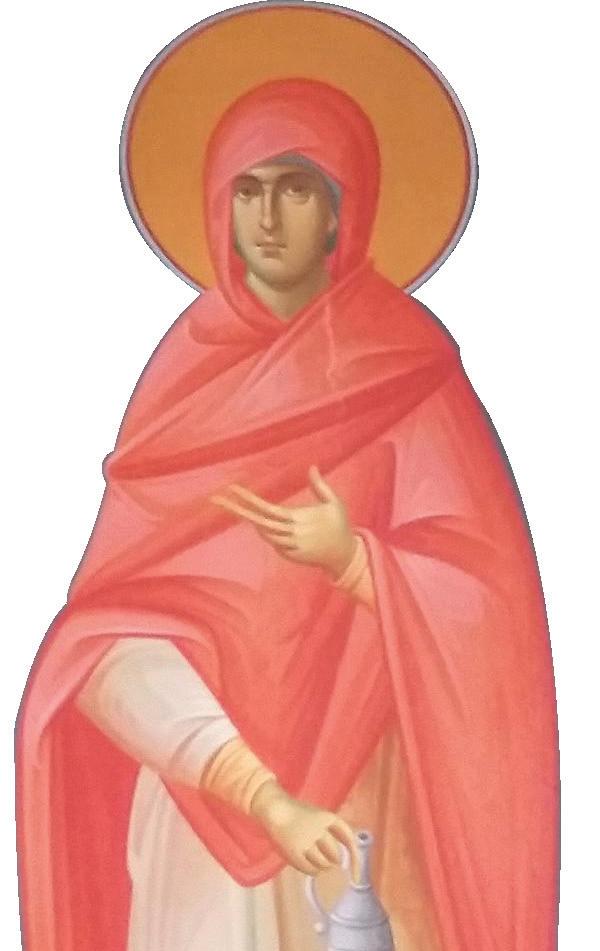
This Month in The Courier Archives ---------------------------------25, 50 & 75 Years Ago----------------------------------
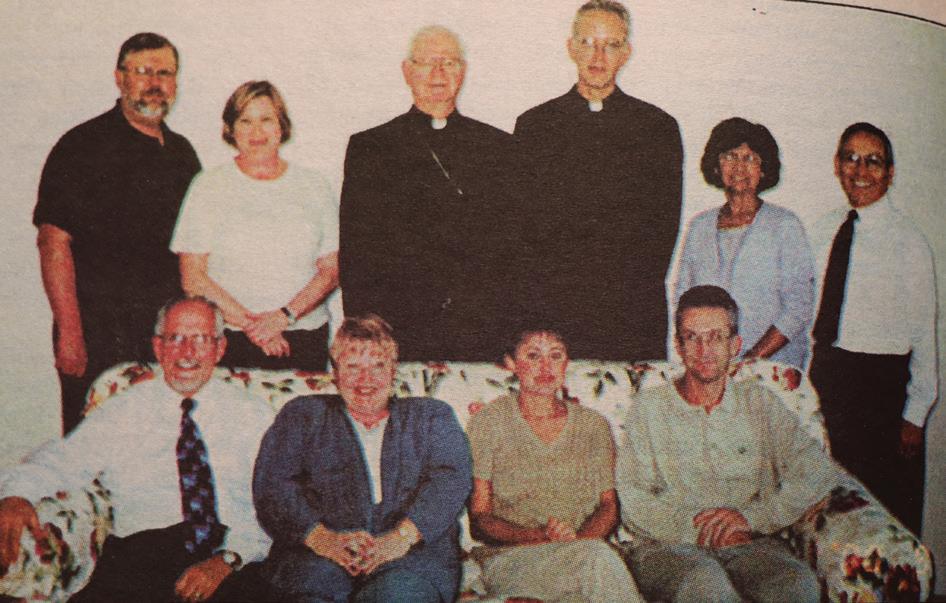
Four deacons and their wives join Bishop Harrington and Father Timothy Reker for the first official gathering of the diaconate community in the Diocese of Winona. The event took place at the rectory of St. Francis of Assisi Church in Rochester, where Fr. Reker is pastor, on September 7. It was an opportunity for socializing, fellowship and information about the new diaconate program in the diocese. From left to right are (standing) Deacon George T. Anderberg, Mary Kay Anderberg, Bishop Harrington, Fr. Reker, Minnie Gonzales, Deacon Gumisindo Gonzales; (seated) Deacon Gordon Richard, Alma Richard, Janie Hillyer, and Deacon Paul Hillyer. Deacons Anderberg and Hillyer minister in Owatonna, and Deacons Richard and Gonzales minister in Winona and Rochester, respectively. Photo by Todd Graff.
Reprinted from October 2000.

Rosary march competes with Viking game - Mankato area Catholics held a Rosary march, Sunday, Oct. 12, at 2 p.m., during the Viking game. Several hundred people from various parishes participated. The march began at Ss. Peter and Paul Church and is shown here arriving at St. John the Baptist Church. Father Frederick Woodford, pastor of St. John's, was the celebrant for Benediction. Msgr. Alton H. Scheid was the speaker. [Photo by Father Charles Kerr, S.J.]
Reprinted from October 24, 1975.
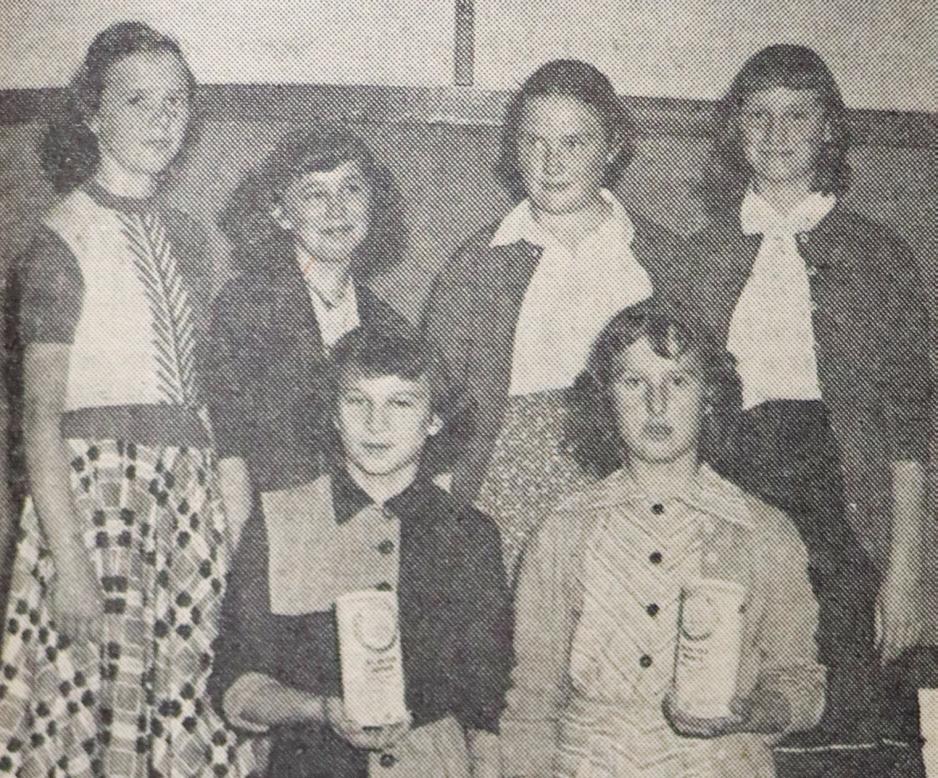
Jackson - The girls of the upper four grades of Peace Memorial School, here, volunteered their services to sell the "Forget-Me-Nots," veteran-madeflowers, for the Disabled American Veterans, on October 7.
They conducted the sale all day and made personal solicitations for the sales donations
The proceeds go directly to the American Veterans to make their lives a little more pleasant.
The girls volunteered for the sale as a project in connection with their Civics Club.
The above pictured girls are some of the Captains of the group. They are left to right: Kneeling - Karen Stinar and Ruth Betlach. Back row: Sylvia Schlager, Bernice Pletz, Norma Kable and Sandra Kable.
Reprinted from October 22, 1950.
From the Bishop
He Died with a Microphone in His Hand
�hy has the murder of Charlie Kirk resonated so powerfully through the culture? Is it because he was cut down so brutally in his prime? That he left behind a wife and two very young children? That no one deserves to die that way? Certainly for all of those reasons. But I am convinced there is something more, and it has to do with the fact that he died with a microphone in his hand - not a gun or a knife or a grenade, but a microphone.
Charlie Kirk’s method, which he practiced on college campuses all over the country, was to invite into a public dialogue people who disagreed with him. In employing this method, Charlie was standing in a venerable tradition that stretches back to ancient times and provides one of the foundations of Western civilization. In the streets and byways of fifth century BC Athens, Socrates spoke, especially to the young, not through diatribes, but through conversations. Socrates’s greatest disciple Plato gave us, in his famous dialogues, a literary version of these complex conversations.
There is a Christian version of this in the work of my intellectual hero, St. Thomas Aquinas. In the universities of
the Middle Ages, learning took place principally through what were called quaestiones disputatae (disputed questions). These were public exercises in which a master such as Aquinas would lay out his resolution of an issue and would subsequently entertain objections - sometimes dozens or hundreds - and finally respond to the objections one by one.
There are two basic assumptions that undergird this dialogic method, namely, the dignity of the human person and the objectivity of truth. If one doesn’t believe in the dignity of the individual, then the best way to get everyone to agree is simply to brutalize or eliminate one’s opponents. But if one holds to the intrinsic value of each human being, one will use words rather than guns. The second assumption is that there is a rational structure to the world and hence objective values, to which one can appeal when speaking to an opponent. If there is no such structure to which the two interlocutors can appeal, their argument will devolve into a shouting match.
revere the individual human being because he or she is a beloved child of God. And why do we think there is a shared framework of meaning? We do so because we believe that the intelligibility of the world and the objectivity of moral value are grounded in a Creator God who gave rise to them.
If one doesn't believe in the dignity of the individual, then the best way to get everyone to agree is simply to brutalize or eliminate one's opponents.
So, what happens when the existence of God is denied or when the practice of religion fades away? What happens is that the conditions for the possibility of civil conversation are fatally compromised. I came across just the other day a deeply disturbing statistic that fully 42% of Gen Z young people feel that it is sometimes permissible to respond to speech with violence. If argument is pointless, bombs and bullets become inevitable.
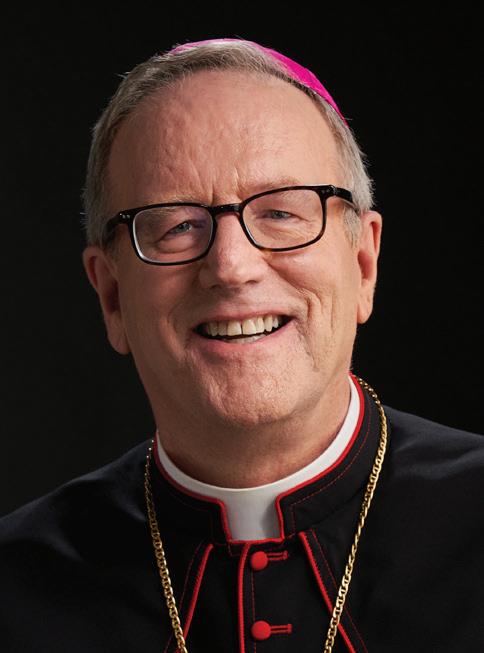
Now, both of these assumptions are themselves predicated upon an even more fundamental axiom, namely, the existence of God. We
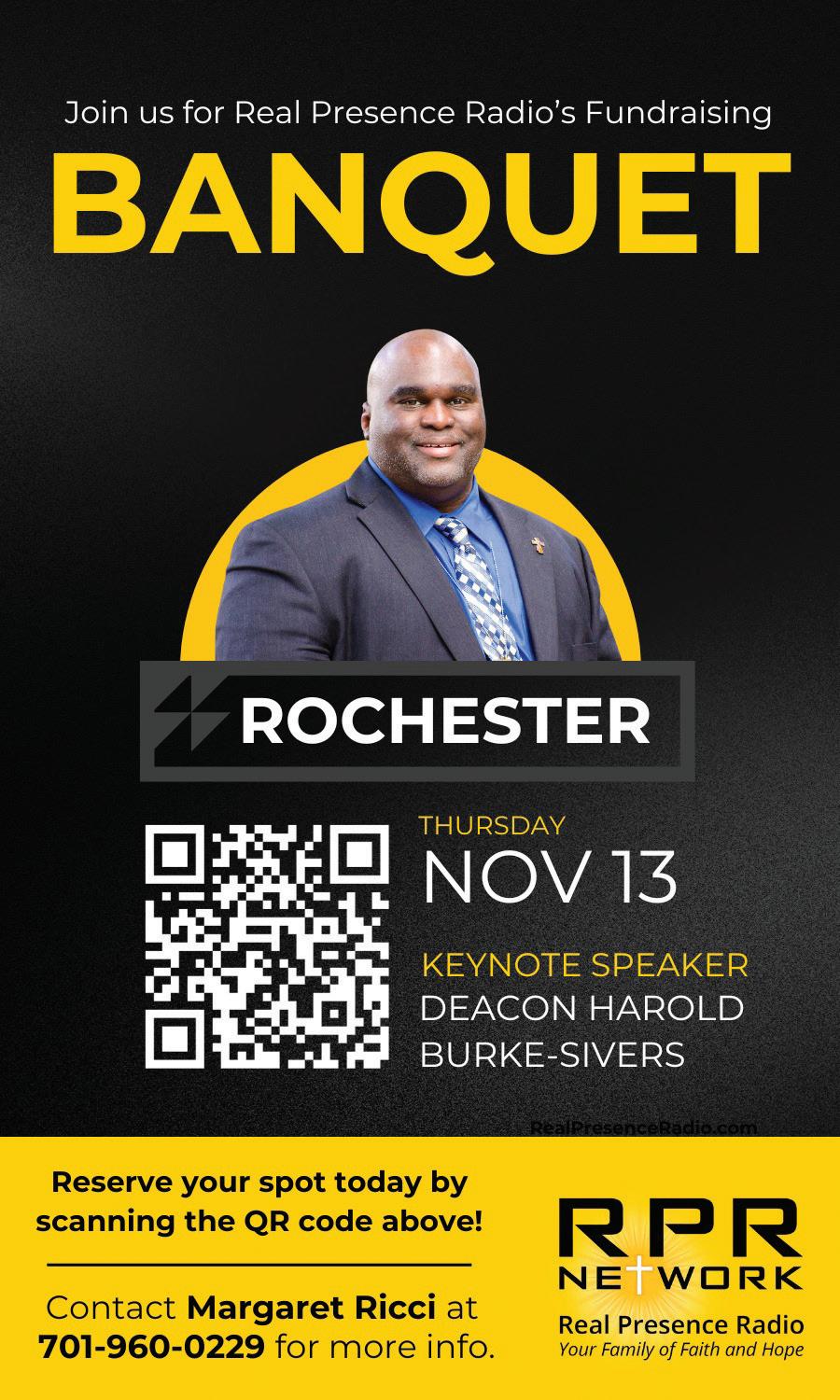
Bishop's Calendar
*indicates event is open to the public
I cannot help but see a correspondence between that awful stat and the steady increase in disaffiliation from the churches, especially among the young. When people stop going to church, they stop thinking about God, they stop praying, they don’t hear about the Ten Commandments, they don’t attend to the cry of the prophets on behalf of the poor, they don’t read the Sermon on the Mount, they don’t take in “whatsoever you do to the least of my brothers, you do it to me.” And when none of that is
September 29 - October 2, Monday-Thursday Presbyteral Days - Okoboji, IA
October 4, Saturday
*4:30 p.m. - Mass - St. Joachim, Plainview
October 5, Sunday
4:30 p.m. - Mankato Newman Center Gala - Mayo Clinic Health System Event Center, Mankato
October 7, Tuesday
5 p.m. - New Ressourcement Conference Opening MassRochester
October 8, Wednesday
5 p.m. - Mass - Immaculate Heart of Mary Seminary, Winona
October 9-10, Thursday-Friday St. Mary's University of Minnesota Board Meeting - Winona
October 11, Saturday
2 p.m. - Confirmation - St. John the Baptist, Mankato
October 14, Tuesday
*8:30 a.m. - Staff Mass - The Chancery, Rochester
October 16-17, ThursdayFriday
Word on Fire Board MeetingRochester
October 18, Saturday
*4 p.m. - White Mass - St. Marys Hospital Chapel, Rochester
October 19, Sunday
*9 a.m. - Pastor Installation MassQueen of Angels, Austin
assimilated, people stop believing that their brothers and sisters should be cherished and that a morality beyond the clash of wills is possible.
And all of this brings me back to Charlie Kirk. To his dying moment, Charlie was engaging in a practice that goes back to Socrates and that informs the West at its best. And that is precisely why we all feel so unnerved by his death. We sense that something basic to our civilization is teetering. My sincere hope and prayer is that we can take renewed inspiration from a courageous and religious man who died, not with a gun in his hand, but rather an instrument of communication.
October 24-25, FridaySaturday
Good News Conference - Orlando, FL
October 28, Tuesday
*8:30 a.m. - Staff Mass - The Chancery, Rochester
12 p.m. - Pension Plan for Priests Board Meeting - The Chancery, Rochester
*5 p.m. - 40 Days for Life Prayer Vigil - Planned Parenthood, Rochester
October 30, Thursday
*8:30 a.m. - Staff Mass - The Chancery, Rochester
1 p.m. - Clergy Personnel Committee - The Chancery, Rochester
Non Nisi Te Domine
Bishop Robert Barron
Murió con un micrófono en la mano 5
Por el OBISPO ROBERT BARRON
¿� or qué el asesinato de Charlie Kirk ha tenido tanta repercusión en la cultura? ¿Es porque fue asesinado brutalmente en la flor de la vida?
¿Porque dejó atrás a su esposa y dos hijos muy pequeños?
¿Porque nadie merece morir de esa manera? Sin duda, por todas esas razones. Pero estoy convencido que hay algo más, y tiene que ver con el hecho de que murió con un micrófono en la mano, no con una pistola, un cuchillo o una granada, sino con un micrófono.
El método de Charlie Kirk, que practicaba en los campus universitarios de todo el país, consistía en invitar a un diálogo público a personas que no estaban de acuerdo con él. Al emplear este método, Charlie se situaba en una venerable tradición que se remonta a la antigüedad y que constituye uno de los fundamentos de la civilización occidental. En las
calles y callejuelas de la Atenas del siglo V a. C., Sócrates hablaba, especialmente a los jóvenes, no a través de diatribas, sino de conversaciones. El mayor discípulo de Sócrates, Platón, nos dejó, en sus famosos diálogos, una versión literaria de estas complejas conversaciones.
Hay una versión cristiana de esto en la obra de mi héroe intelectual, Santo Tomás de Aquino. En las universidades de la Edad Media, el aprendizaje se llevaba a cabo principalmente a través de lo que se denominaba quaestiones disputatae (cuestiones disputadas). Se trataba de ejercicios públicos en los que un maestro como Aquino exponía su resolución de un problema y, a continuación, atendía las objeciones - a veces docenas o cientos - y, finalmente, respondía a las objeciones una por una.
Hay dos supuestos básicos que sustentan este método dialógico, a saber, la dignidad de la persona humana y la
On August 31, Bishop Barron installed Father Robert Horihan as the rector of the Co-Cathedral of St. John the Evangelist in Rochester. Father Horihan was officially presented to the parish staff and community and recognized as rector of the parish. He made a profession of faith and an oath of fidelity, marking the beginning of his service to the faith community of the Co-Cathedral.
On Se�tembe� 12, Bishop Barron was at St. John Vianney Church in Fairmont to celebrate a Mass of Candidacy for the diaconate of the Diocese of Winona-Rochester. There are currently eight candidates for the diaconate: (pictured L to R with Bishop Barron in lower left picture) Steven Breiter, Mark Engesser, Arlo Drees, Timothy Clements, Timothy Gossman, Justin Carlin, Joseph Mytych, and Brian Zogg. Please pray for them through their journey of formation and discernment!
Photos by Emily Smithley, media specialist for the Diocese of WinonaRochester.
objetividad de la verdad. Si uno no cree en la dignidad del individuo, entonces la mejor manera de conseguir que todos estén de acuerdo es simplemente brutalizar o eliminar a los oponentes. Pero si uno se aferra al valor intrínseco de cada ser humano, utilizará las palabras en lugar de las armas. El segundo supuesto es que existe una estructura racional en el mundo y, por lo tanto, valores objetivos a los que se puede apelar cuando se habla con un oponente. Si no existe tal estructura a la que puedan apelar los dos interlocutores, su discusión se convertirá en una pelea a gritos.
Ahora bien, ambos supuestos se basan en un axioma aún más fundamental, a saber, la existencia de Dios. Veneramos al ser humano individual porque es un hijo amado de Dios. ¿Y por qué creemos que existe un marco de significado compartido? Lo hacemos porque creemos que la inteligibilidad del mundo y
la objetividad del valor moral se basan en un Dios creador que les dio origen.
Entonces, ¿qué sucede cuando se niega la existencia de Dios o cuando la práctica de la religión se desvanece? Lo que ocurre es que las condiciones para la posibilidad de una conversación civilizada se ven fatalmente comprometidas. El otro día me encontré con una estadística profundamente inquietante: el 42 % de los jóvenes de la generación Z cree que a veces es permisible responder a las palabras con violencia. Si el debate no tiene sentido, las bombas y las balas se vuelven inevitables.
No puedo evitar ver una correspondencia entre esa terrible estadística y el aumento constante de la desafiliación de las iglesias, especialmente entre los jóvenes. Cuando la gente deja de ir a la iglesia, deja de pensar en Dios, deja de rezar, no oye hablar de los Diez Mandamientos, no atiende al clamor de los profe-
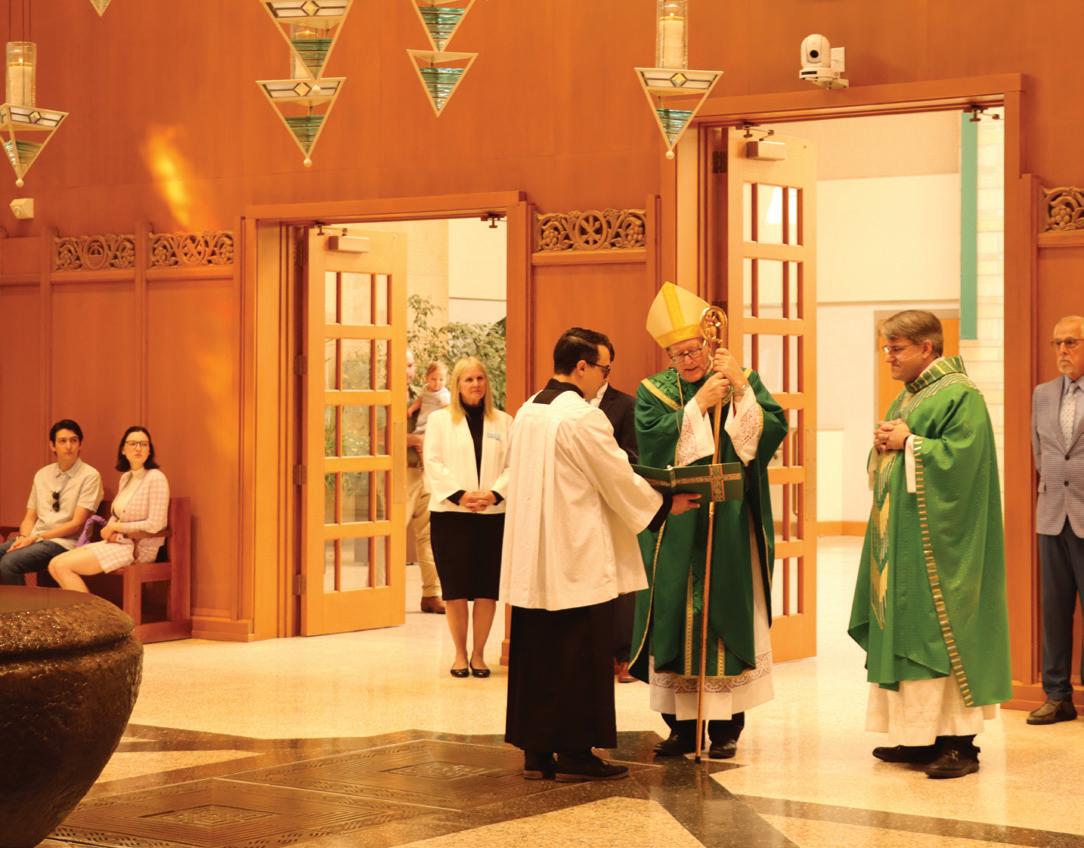
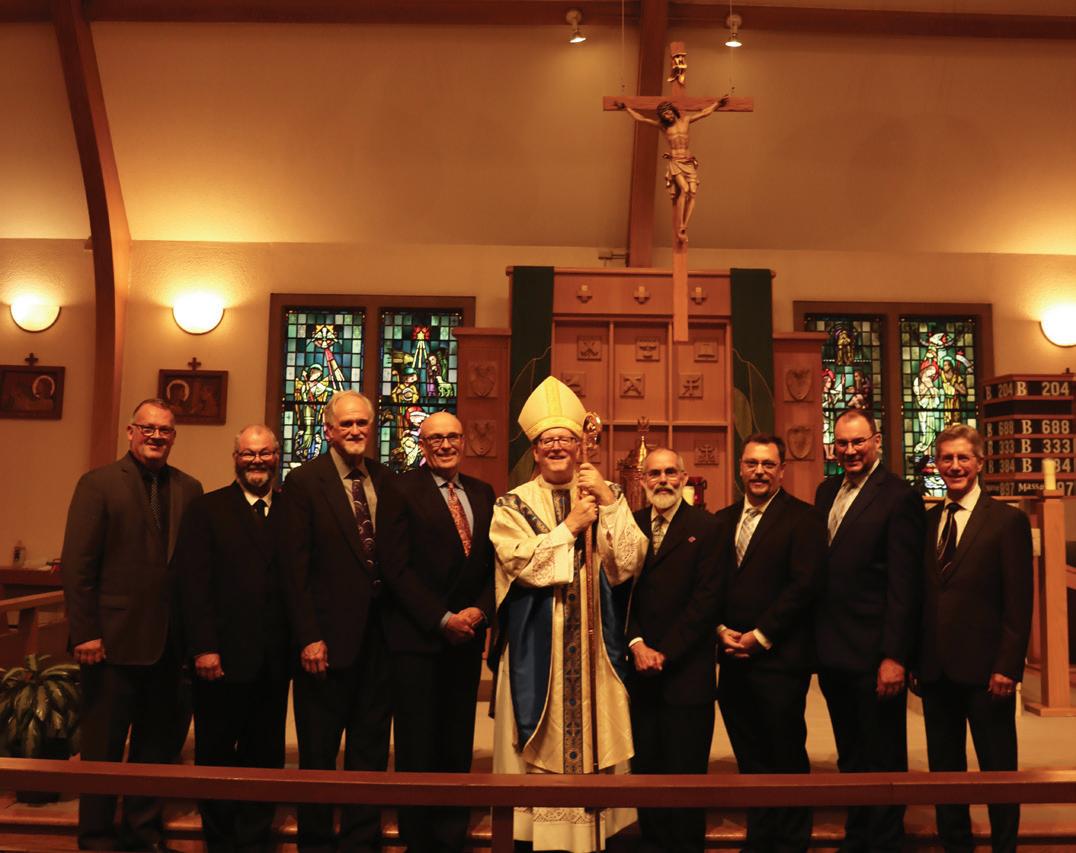
tas en nombre de los pobres, no lee el Sermón de la Montaña, no asimila «todo lo que hagas al más pequeño de mis hermanos, me lo haces a mí». Y cuando no se asimila nada de eso, la gente deja de creer que hay que amar a sus hermanos y hermanas y que es posible una moralidad más allá del choque de voluntades.
Y todo esto me lleva de vuelta a Charlie Kirk. Hasta el momento de su muerte, Charlie se dedicó a una práctica que se remonta a Sócrates y que inspira lo mejor de Occidente. Y es precisamente por eso que todos nos sentimos tan desconcertados por su muerte. Sentimos que algo fundamental para nuestra civilización se está tambaleando. Mi sincera esperanza y oración es que podamos inspirarnos de nuevo en un hombre valiente y religioso que murió, no con un arma en la mano, sino con un instrumento de comunicación.

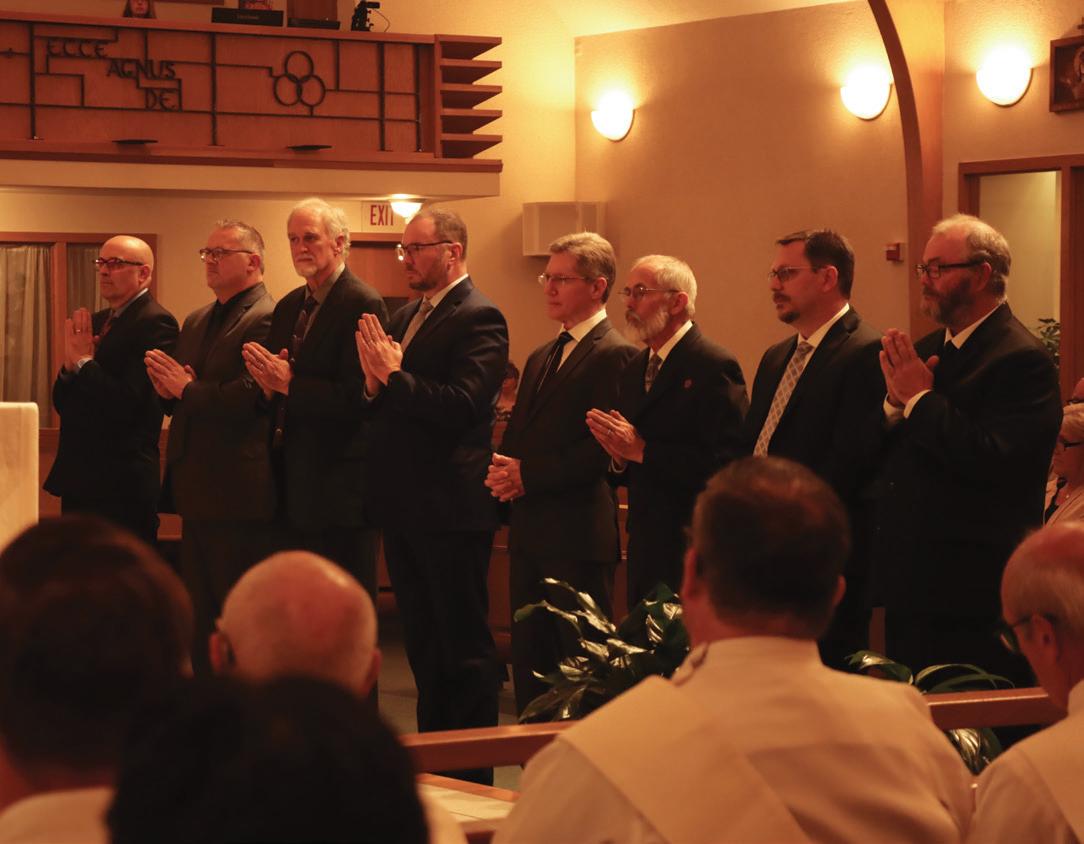
Sisters of Mercy Expand Their Mission
By NICOLE WENINGER and SR. MARY MICAELA HOFFMANN, RSM
�ocated next to Immaculate Heart of Mary Seminary and in the heart of Saint Mary’s University campus is the Immaculate Heart Convent. What began as an overnight stay in a guest room has since become a convent next door to the seminary for the Religious Sisters of Mercy of Alma, MI, in Winona.
In 2011, Bishop Quinn invited one of the Sisters to serve as director of faith formation for the Diocese of Winona-Rochester. Sr. Mariana Koonce, RSM, then started commuting from Jackson to Winona every few weeks for chancery meetings and other in-office work. She would stay overnight with the FOCUS missionaries.
In the spring of 2012 the Superior General and Vicar General of the Religious Sisters of Mercy came for an annual visitation of the Jackson Convent, and Bishop Quinn invited them to a Holy Hour and dinner at his house in Winona. That is when he offered the Religious Sisters of Mercy a convent by the seminary, and the Superior General accepted!
Since then, the Religious Sisters of Mercy have become an active and valued part of the Winona community. Over the past nearly 14 years, their presence has allowed them to offer a variety of spiritual and educational opportunities, including work with Catholic Charities and the Newman Center on the Winona State Campus, and teaching from prekindergarten children all the way up to graduate level students. Several Sisters have also benefitted from educational opportunities in Winona. The Sisters currently assigned to the Immaculate Heart Convent are Sr. Mary Micaela, Sr. Agnes Mary, Sr.
Mary Frances, and Sr. Mary Ignatius. Their apostolic works and outreach initiatives include:
1. Monthly "Aquinas Evenings" - A time for faith formation, a shared meal, and fellowship during the school year, geared toward local university students and young adults.
2. Annual Mothers' Retreat – Held in spring, and a successful event for the past few years.
3. Involvement in education – The Sisters participate in programs at Saint Mary's University and in catechesis at the St. Luke campus of Cotter Schools. Although these works take place off-site, the convent provides necessary housing for the Sisters involved.
4. Vocations outreach – The Sisters regularly receive invitations to speak on religious vocations throughout the diocese and occasionally host visiting groups at the convent.
The convent is the place where the Sisters receive the grace and mercy of God in their prayer and common life in order to be able to go out and serve in the Diocese. While the convent has served as a comfortable home for over a decade, growth in both the order and its outreach requires physical expansion. For that reason, the Immaculate Heart Convent will soon undergo renovations to expand and improve its facilities. Part of this project includes creating a space for gatherings and community events, and adding additional bedrooms for current, visiting, and hopefully future Sisters.
Groundbreaking is scheduled for late October of this year with a tentative completion date of April
Pilgrimages of Hope,
pilgrimages are taking place across the U.S. during the Season of Creation (September 1 - October 4 (the Feast of St. Francis), 2025). A nation-wide map of pilgrimage locations can be viewed at catholicpilgrimsofhope.org.
In Minnesota, and especially here in the Diocese of Winona-Rochester, a beautiful variety of pilgrimages were celebrated in September in Winona, Rochester and Pipestone, with a Mankato pilgrimage
In W�nona, 27 �eo��e conducted a Pilgrimage of Hope for Creation, to the Mississippi River on Saturday, September 20, 2025. The event sponsors were the Social Concerns Committee from the Church of St. Mary, Citizens Climate Lobby, the Izaak Walton League, and the Minnesota Marine Art Museum. In addition to walking a short distance to Levee Park, participants heard a presentation on the health of the river, engaged in prayer and small group dialogues on implementing the tenets of Laudato Si, and learned of opportunities to join others in protecting the health of our air, water, and soil.
Photo and caption submitted by TOM PARLIN, a parishioner of St.
cont'd from pg. 1
scheduled for October 5.
In journeying together as people of faith and people of good will, we are reminded of our fundamental interdependence with God, creation, and each other as a human family. This “integral ecology” defines not two separate crises, social and environmental, but calls us to hear and respond to both “the cry of the earth and the cry of the poor.” Our responsibility is emphasized by Pope Leo XIV:
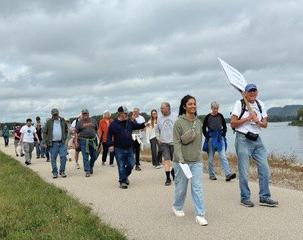
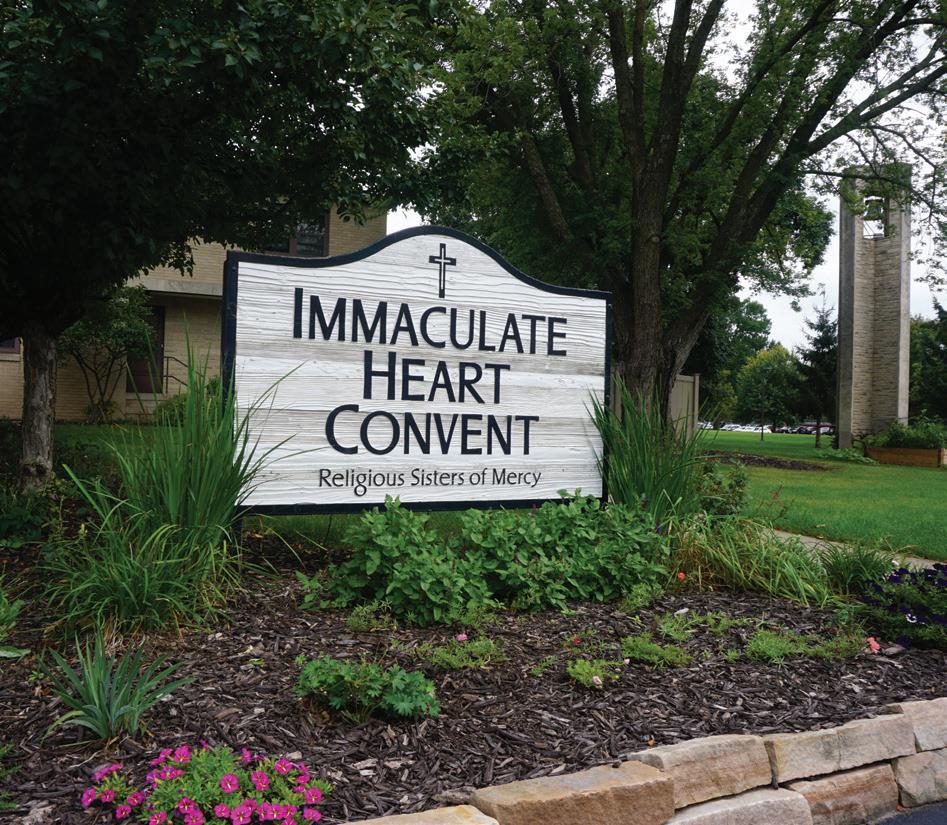
2026.
To support this important work, the Sisters will launch a fundraising campaign in partnership with IHM Seminary and the Catholic Foundation of Southern Minnesota beginning this October. The projected cost for the construction is $730,000. Please prayerfully consider contributing to this community-focused effort. To donate, please visit our donation page at catholicfsmn.org/conventexpansion-project, or call us at 507-858-1275 to inquire.
Nicole Weninger is a marketing and communications associate for the Catholic Foundation of Southern Minnesota.
Sister Mary Micaela Hoffmann is a Religious Sister of Mercy of Alma, MI.
Care of creation, then, represents a true vocation for every human being, a commitment to be carried out within creation itself, without ever forgetting that we are creatures among creatures, and not creators.
We walk in praise and gratitude for the gift of creation.
We walk in lament for the ways we have abused and exploited creation in small ways that have been allowed to grow and spread, creating suffering, hardship and chaos on a global scale.
We walk to beg for conversion of heart that seeks always God’s will for the goodness, truth, and beauty that sustains us all.
We walk for the awareness of our deep interconnectedness and interdependence, and for compassion to act on behalf of those without voices.
We walk to be bound in beloved community seeking restoration of our common home.
We are reminded that “our feet take us toward mercy and compassion, the healing of borders and boundaries with truth and integrity. Together we walk. Amen.
Watch for more pictures of pilgrimages around our diocese, the state, the nation, and the world. Be inspired by the community of believers seeking ways to change the face of the earth!
Mary Vlazny is the director of social action for the Co-Cathedral of St. John the Evangelist in Rochester.
Mary, Winona.
Living Heroically Holy at St. John Vianney School, Fairmont
Submitted by SARAH STRIEMER
this year’s theme at St. John Vianney Catholic School in Fairmont is Live Heroically Holy. We are celebrating saints all year and learning how to live our lives as the saints did.
Each month a different grade is hosting a prayer service to introduce a new group of saints to us. During the month of September, our focus was on saints who are patrons of education, students, teachers, and Catholic schools. The sixth grade class taught us about St. Thomas Aquinas, St. Elizabeth Ann Seton, St. Joseph of Cupertino and St. Catherine of Alexandria, and we also included St. Carlo Acutis since he, along with St. Pier Giorgio Frassati, was newly canonized. Throughout the month of September, our priests, Father Jeff Dobbs and Father Tim Welch, talked about the saints while visiting classrooms each Thursday morning.
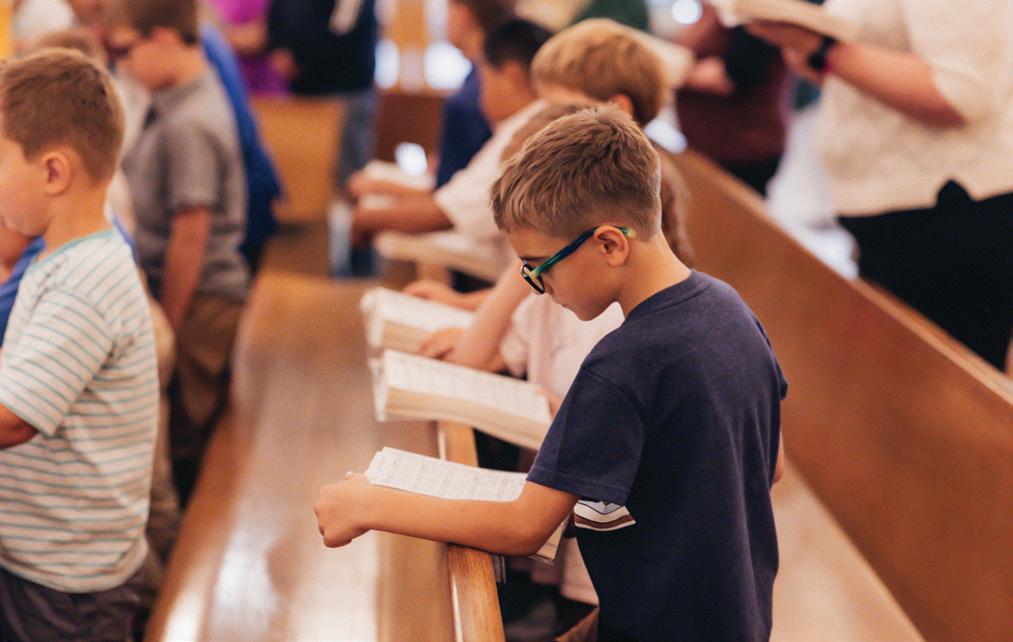
Our focus for the month of October will be Mary, the holy Mother of Jesus. We will learn many of the different titles that Mary has, including: Our Lady of Lourdes, Our Lady of Sorrows, Queen of Peace, Our Lady of Fatima, Our Lady of Guadalupe, and many more!
Hope in Action
A 'How-To' on St. John Vianney's Outreach Through the Hope Shop
By ELIZABETH WILLIAMS
�n the heart of Fairmont, a humble ministry is radiating Christ’s love through practical charity. St. John Vianney Parish has opened its doors - not just the doors of the church, but of its heart - to serve neighbors in need through the Hope Shop, a volunteer-run initiative rooted in compassion and dignity.
Open two days each week, the Hope Shop offers free food, clothing, diapers, and household goods to individuals and families facing economic hardship. What began as a small outreach effort has blossomed into a vital lifeline for many in the Fairmont area.
The spirit of the Hope Shop is both welcoming and respectful. Guests are greeted with warmth and encouraged to choose items that meet their personal and household needs - restoring a sense of agency that is often lost in times of crisis.
“Guests are able to come for food once per month but can come as often as they like for clothing or other household items,” says St. John Vianney Parish Secretary Angela Schultz.
So, how does St. John Vianney Parish do it? Schultz, as well as Hope Shop Founder Angie Nagel, shared some great advice with us.
The Challenge
Martin County has a 13.7% poverty rate, placing it among the highest poverty rate among counties in the state of Minnesota. There is a broad spread of socioeconomic situations, including a high rate of immigration locally.
Advice to Start Your Own Shop of Hope
• Get Inspired & Research
• Set Firm Hours
• Good, Reliable Volunteers
• Set Boundaries
• First Floor Location
St. John Vianney parishioners researched the area need and sought to understand what current services were available.
"First, get really inspired. See what the need is, advised Nagel. Find out what your county poverty rate is - you will likely be surprised. Talk to other service groups in the area, pregnancy centers, MVAC, St. Vincent de Pauls, things like that. They will tell you about the people who sleep in the park, or sleep in their cars when most of the community has no idea you have a homeless problem. If someone in your church works at Human Services, see what they can tell you about the number of people who are on SNAP or rely on other benefits to make ends meet. A lot of times these statistics and stories are eye-openers. Get inspired, and then go!”
Set Firm Hours
“At first our Hope Shop was always open, and whenever someone came into the parish center, a staff member would stop what they were doing and take the person into the Hope Shop. That doesn’t work," said Nagel. "A person with interruptions doesn’t get things done. If people know that you are open during 'these hours,' they will come then. Perhaps consider having two separate times, a daytime and an evening, once things really get moving.”
Good, Reliable Volunteers
No good program can succeed without an effective team. But this program didn’t have unlimited funds to hire. Instead, St. John Vianney sought reliable volunteers to spread out the effort and make it manageable. Nagel explained, “Have GOOD, RELIABLE volunteers. Otherwise the responsibility falls to one
The following themes for each month will be:
• November - Saints who lived lives of gratitude. We will host an All Saints Day retreat for our students to celebrate all saints! Students can dress as their favorite saints, learn more about certain saints, and participate in fun activities throughout the day. The intention for this retreat will be to help our students grow in holiness, helping them to Live Heroically Holy!
• December - Patron saints of children
• January - The Apostles
• February - Saints who teach us about friendship and loyalty
• March - Saints who worked to spread Christianity
• April - Saints who showed special care for the earth
Each student will complete a project appropriate for their grade level that will be displayed during our spring concert. They will pick their favorite saint they have learned about for this project.
Sarah Striemer is the principal of St. John Vianney School in Fairmont.

person and it can easily be overwhelming.”
Set Boundaries
While St. John Vianney did set out to change the world, they couldn’t change the entire world! “Set boundaries,” Nagel advised. “It’s amazing how word spreads. Our boundaries include the two counties our cluster of parishes are in. If you don’t have boundaries from where people can come to be customers, people from all over will come (seriously, it happens), and you will not be able to keep enough food in stock."
First Floor Location
“And finally, a HUGE one for us that we wish, more than anything, we could change: have it on the first floor! Our Hope Shop in in the basement and that creates a ton of work hauling groceries and clothing or household donations in, but it's also work for our customers, who are sometimes disabled, elderly, or
Join Us in the 2026 Walk to Mary Registration Opens October 9
By BRIAN HANSEN
I am the Queen of Heaven who prays for the conversion of sinners, and I wish you to do the same.
-Our Lady of Champion to Adele Brise �ast May, the Diocese of Winona-Rochester participated for the first time in the annual Walk to Mary, a pilgrimage walk that occurs in the Diocese of Green Bay, WI. In one day, 28 pilgrims from our diocese walked 22 miles with more than 7,000
Hope in Action, cont'd from pg. 7
otherwise have mobility issues. Having a first-floor Hope Shop is a dream of ours, for both our volunteers and our guests!”said Nagel.
More Logistics Straight from St. John Vianney
Guests are able to come for food once per month but can come as often as they like for clothing or other household items. The Hope Shop does not distribute food by pounds; rather, each guest is able to take a certain number of cereals, cans of vegetables, fruits, fresh potatoes, fresh meat, etc.
Some of the food is donated by parishioners who see items on sale at the store and buy them for The Hope Shop. People will also bring in produce from their gardens.
Beloved
Diocesan Women's Conference Schedule Released
By PETER MARTIN
�adies, you don’t want to miss this year’s Beloved Conference! Come hear Lisa Gray share about her sister’s holy, ordinary and extraordinary life. Beloved is more of a retreat than a conference; allow yourself to spend a day receiving and soaking in God’s great love for you! You are beloved! Let yourself be loved! Register today!
dowr.org/event-details/3780
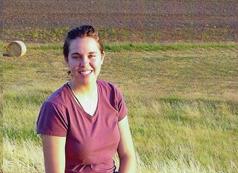
other pilgrims to the National Shrine of Our Lady of Champion (OLC). This shrine is the only Churchapproved Marian apparition site in the United States of America. For more than 12 years now, people of various ages, races, and nationalities all come together in early May to participate in this sacred pilgrimage experience. Pilgrims remember Mary’s appearance to a young woman named Adele Brise in Champion, WI, and the messages she spoke to her in 1859. Pilgrims also journey spiritually with Joseph
By and large, though, the funding comes in cash from parishioners. An envelope goes out every other month for The Hope Shop, and people are very generous in donating through that. There are also occasional donations from organizations like the Martin County Pork Producers who want to support area food shelves.
All together it takes up to 35 volunteer hours per week to make The Hope Shop work. That includes
• grocery shopping
• stocking shelves
• sorting donations
• working with the guests who come in. The workers are volunteers. As far as assistance from church staff goes, they spend time carrying down donations that come in during the week (often heavy, and donors may be older folks who don’t want to navigate the steps), making copies of paperwork, flyers or signage, and just taking phone calls and
8:30 a.m. - Doors open
9:00 a.m. - Welcome
9:15 a.m. - Keynote: Elizabeth Leon - "Let Yourself be Loved"
10:15 a.m. - Beloved Activity
11:15 a.m. - Holy Sacrifice of the Mass presided by Bishop Robert Barron
12:30 p.m. - Lunch
1:30 p.m. - Afternoon talk: Lisa Gray - "My sister, Ven. Michelle Duppong"*
and Mary to witness their love and fidelity to Jesus Christ.
The Diocese of Winona-Rochester invites all Catholics of our local Church to prayerfully consider registering to join our diocesan pilgrimage group for the 2026 Walk to Mary. The dates for next year’s pilgrimage are Friday, May 1, through Sunday, May 3, 2026; the actual pilgrimage walk to the OLC Shrine will occur on Saturday, May 2. In the coming weeks, more details for this diocesan pilgrimage event will be made available along with access to online registration on the diocesan website. Registration for the 2026 Walk to Mary will officially open on Thursday, October 9, the feast day of Our Lady of Champion. Please be on the lookout for promotional announcements for this pilgrimage and we hope many Catholics of our diocese will journey with us! Thank you and God bless!
Brian Hansen is the coordinator of adult/lay formation for the Diocese of Winona-Rochester.
other communications related to The Hope Shop. That is usually just an hour or two a week.
Hope in Action
The Catholic Foundation of Southern Minnesota celebrates this beautiful embodiment of Catholic social teaching - particularly the preferential option for the poor. The Hope Shop is more than a place to pick up essentials; it’s a place where human dignity is honored, mercy is extended, and the Gospel is quietly but powerfully proclaimed.
We look forward to walking alongside more parishes exploring creative ways to meet their communities’ needs. St. John Vianney reminds us that when we respond to hunger, hardship, and hope with open hands and hearts, Christ multiplies every offering.
Elizabeth Williams is the executive director of the Catholic Foundation of Southern Minnesota.
2:30 p.m. - An Hour of Adoration & Confession
3:30 p.m. - Beloved Activity
4:00 p.m. - Speaker panel Q&A and closing remarks from Elizabeth Leon 4:45 p.m. - Closing Prayer
*Our conference will also celebrate the third anniversary of Bishop Kagan declaring Michelle Duppong a Servant of God on November 1, 2022!
Peter Martin is the director of life, marriage and family for the Diocese of Winona-Rochester.
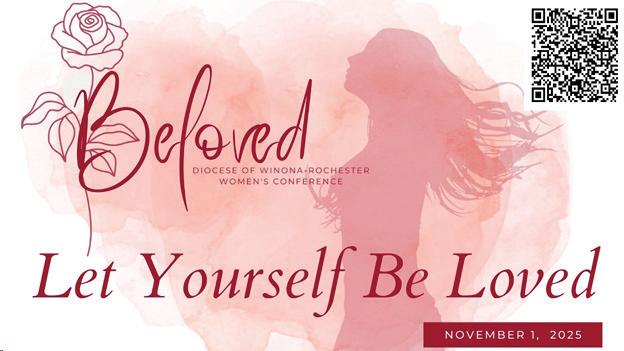
Venerable Michelle Duppong was from rural North Dakota.
Leadership Rooted in Healing and Hope
By SHELLY HOLT
� want to highlight the United States Conference of Catholic Bishop’s Mental Health Campaign Healing and Hope. Because NCCW follows the lead of the USCCB and its initiatives, I offer both a personal reflection and a leadership call for how we treat one another in our organizations.
Mental health has touched my life deeply. From early trauma through adulthood, I’ve faced challenges that shaped how I experience the world. I became skilled at hiding my struggles - often through compliance, people-pleasing, and keeping a calm exterior. It was only after nearly losing my life that I received a diagnosis and began to better understand my own journey. Through graduate study and clinical practice, I also learned how mental health labels can be both clarifying and limiting. They may guide treatment, but they never capture the fullness of a person’s dignity. Above all, I know that I am a beloved child of God, created in His image and likeness.
That truth is not just personal - it is also profoundly communal. Leaders are entrusted with the care of people whose stories are often hidden, tender,
and complex. We rarely know the full weight that our members carry. Leadership, then, calls us to:
• See with compassion: Recognize that each member brings unseen struggles as well as unique gifts.
• Listen with patience: Create space for voices to be heard without judgment.
• Support with humility: Provide resources and encouragement, but also honor each person’s dignity by not reducing them to their struggles.
• Lead with love: Root decisions and interactions in Christ’s command to love one another.
The USCCB’s Healing and Hope campaign models this spirit. Its Novena for Mental Health, prayed from October 10-18 each year, unites Catholics across the country in solidarity with those living with mental health challenges and with those who walk alongside them. As leaders, we can take this same posture of solidarity in our councils, parishes, and communities - making them places of safety, welcome, and belonging.

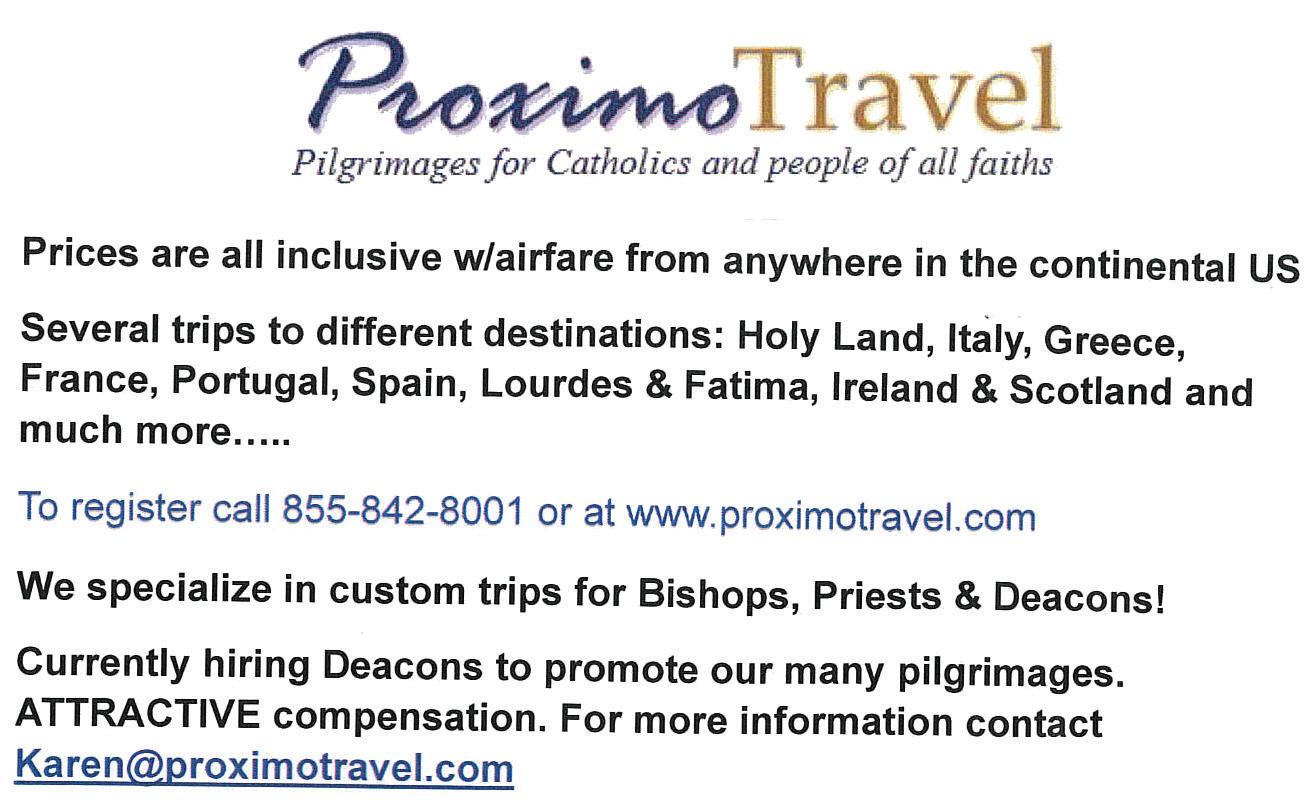
Leadership is never about titles or tasks alone. It is about how we treat one another - how we build a culture of hope where every person knows they are seen, valued, and loved. May we walk together in that hope, leading with compassion and courage.
In other news, there is still time to register or even walk in on the day of our October 11 Convention at St. Adrian Church in Adrian. This is My Body will feature two great speakers, enriching committees, Rosary, Mass, breakfast, lunch, and several gifts and door prizes. Leadership training happens at St. Teresa in Mapleton on CCW Sunday/Mental Health Sunday, October 12 from 1-4 p.m. It will be nice to get to know you!
Shelly Holt is the president of the Winona-Rochester Diocesan Council of Catholic Women.

W-RDCCW Secretary Mary Schweiss, W-RDCCW President Shelly Holt, and Arlyce Anderson of the New Ulm DCCW have fun at Disney Springs during the NCCW Convention, held August 19-23 in Orlando, FL.

Remembering The Most Reverend Bernard Joseph Harrington Seventh Bishop of Winona-Rochester
bishop Bernard J. Harrington, a devoted shepherd of the Church, a cherished uncle and friend, and a man who truly loved life, passed away peacefully on Saturday, August 30, surrounded by family and in the prayers of many whose lives he touched over his 66 years of priestly service.
The youngest of four children born to Irish immigrants John and Norah Harrington of County Cork, who had moved to Detroit, MI, Bishop Harrington grew up in a faith-filled home that fostered both his vocation and his zest for life. He attended St. Cecilia Grade School, Sacred Heart Seminary High School and College, and St. John’s Provincial Seminary. His commitment to education continued with advanced studies at the University of Notre Dame, The Catholic University of America, The Ohio State University, and the North American College in Rome, Italy.
Ordained a priest for the Archdiocese of Detroit on June 6, 1959, Fr. Harrington served in a wide range of pastoral and educational roles, including Pastor of Holy Name Parish in Birmingham and St. Rene Goupil in Sterling Heights, Superintendent of Catholic Schools, and Rector of Sacred Heart Major Seminary. In 1993, he was appointed Auxiliary Bishop of Detroit, and in 1999, he became the Bishop of the Diocese of Winona (now Winona-Rochester), where he served until 2009.
As bishop, he brought both pastoral vision and joyful energy to the diocese. He initiated the Seeds of Faith endowment, supported the formation of permanent deacons, expanded Catholic Charities services, and championed Catholic education and safe environment programs. He especially cherished the presence of a seminary in the diocese and took special pride in the annual Harvest Mass - a celebration that reflected both his love of the land and his love for the people.
Bishop Harrington lived his vocation with great seriousness, but also enjoyed many other interests. A lover of classical music, red wine, and a well-made Manhattan, he was just as comfortable at a formal dinner as he was at a backyard barbecue. His love for Italian cuisine was legendary, and he rarely turned down a good plate of pasta shared with even better company.
He was, quite simply, the life of the party - witty, and always ready with a story. Whether on the golf course, ski slopes, or cheering for the Detroit Lions (with a brief and forgiven flirtation with the Eagles and Vikings), or at dinner parties with parishioners and friends, he brought people together through joy and laughter. His many travels with his dearest priest friends, affectionately called the “Four Fathers,” took him across the globe, from Ireland to India, and left a trail of memories marked by faith, friendship, and a fair share of mischief.
Proud of his Irish heritage, Bishop Harrington served as Grand Marshal of Detroit’s St. Patrick’s Day Parade in Corktown - a role that reflected not only his deep community ties but also his lifelong devotion to Irish culture. For him, the celebration of Irish identity extended far beyond a single day. It was a year-round joy, seen in his cheerful Gaelic greetings to friends and the frequent singing of traditional Irish songs whenever the moment called for it. His pride in his roots brought people together, lifting spirits and honoring the legacy of those who came before.
He also inherited a lifelong love of gardening from his parents, and he cultivated beautiful gardens wherever he lived. From lush backyard plantings to the vibrant balcony and patio arrangements in his Apopka, FL, and Rochester residences and later at Cedarbrook in Northville, MI, he found peace and joy in tending to flowers and greenery. His gardens were an extension of his spirit - nurturing, colorful, and full of life.
In retirement, Bishop Harrington found a second home in Apopka, where he enjoyed many good times with dear friends in the Errol Estates community. In 2023, he returned to Michigan, where - supported by his nieces and nephews and dedicated caregivers - he maintained his active lifestyle. He enjoyed day trips to local Detroit-area landmarks, dined regularly at favorite restaurants, and delighted in family gatherings. At Cedarbrook Senior Living in Northville, he received exceptional care, once again forming meaningful friendships and bringing joy, laughter, and spirited conversation to everyone he met.
He was preceded in death by his beloved parents, his brothers Jack (Marge) and Tim (Kathleen), and his dear sister Irene. He is survived by a large and loving
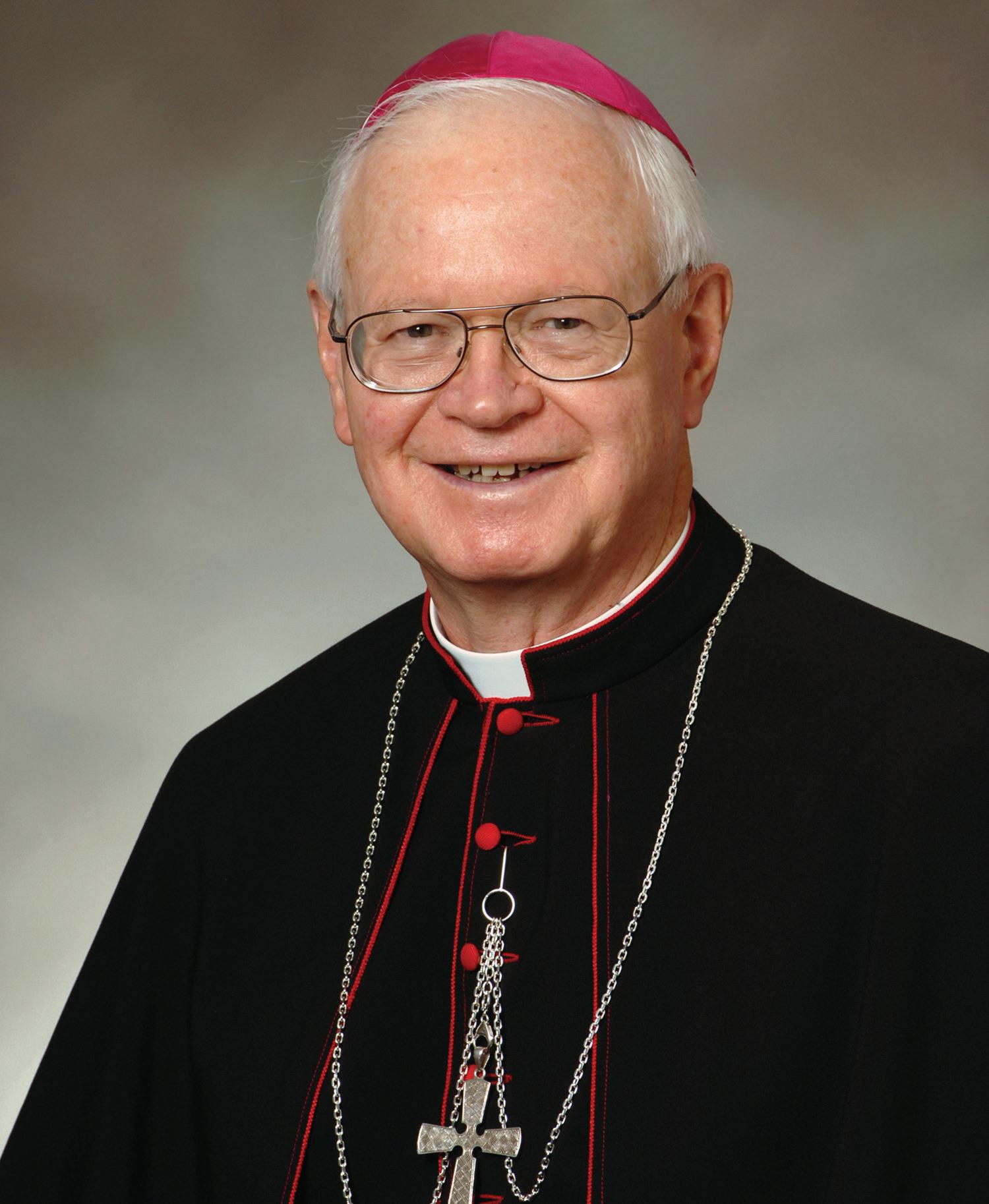
September 6, 1933 - August 30, 2025
extended family: his nieces and nephews Kathy (Joe) Lehrter, Colleen (Kevin) Fitzpatrick, Maureen (Gordie) Sherry, Kathleen (Kevin) Carney, Tim (Lori) Harrington, Mary Pat (Mike) O’Malley, Patrick Harrington, Peggy (Gabriel) Shivers, Michael (Maria) Harrington, and Shelagh (Craig) Gleeson; many grand nieces and nephews; and his treasured priest brothers, Fr. Leo Phalen and Fr. Richard Cassidy.
Bishop Harrington lived a life of deep purpose, joyful presence, and boundless faith. His impact on the Church and on those who knew and loved him will be felt for generations.
Eternal rest grant unto him, O Lord, and let perpetual light shine upon him. May his soul and the souls of all the faithful departed, through the mercy of God, rest in peace. Amen.
The funeral Mass was held Saturday, September 6, 2025, at the Co-Cathedral of St. John the Evangelist in Rochester, followed by committal at St. Mary’s Cemetery in Winona.
Memorial contributions may be made to:
Seeds of Faith Endowment c/o Catholic Foundation of Southern Minnesota 750 Terrace Heights Winona, MN 55987
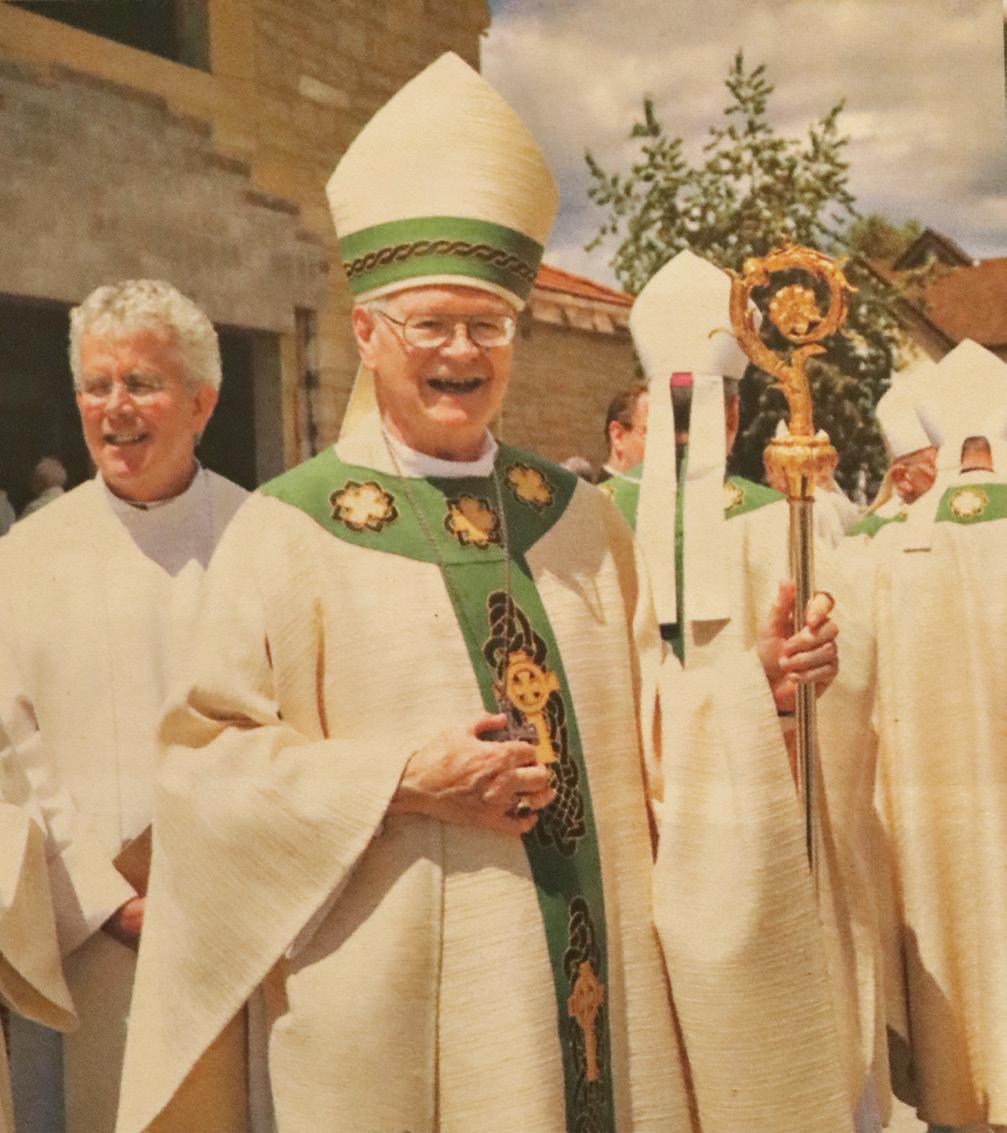

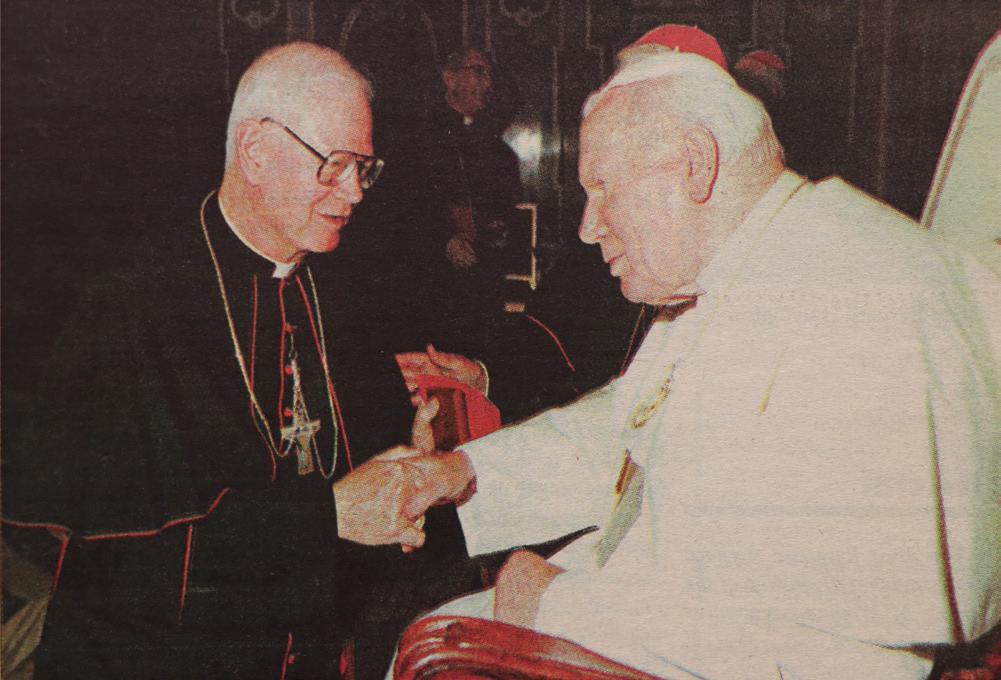
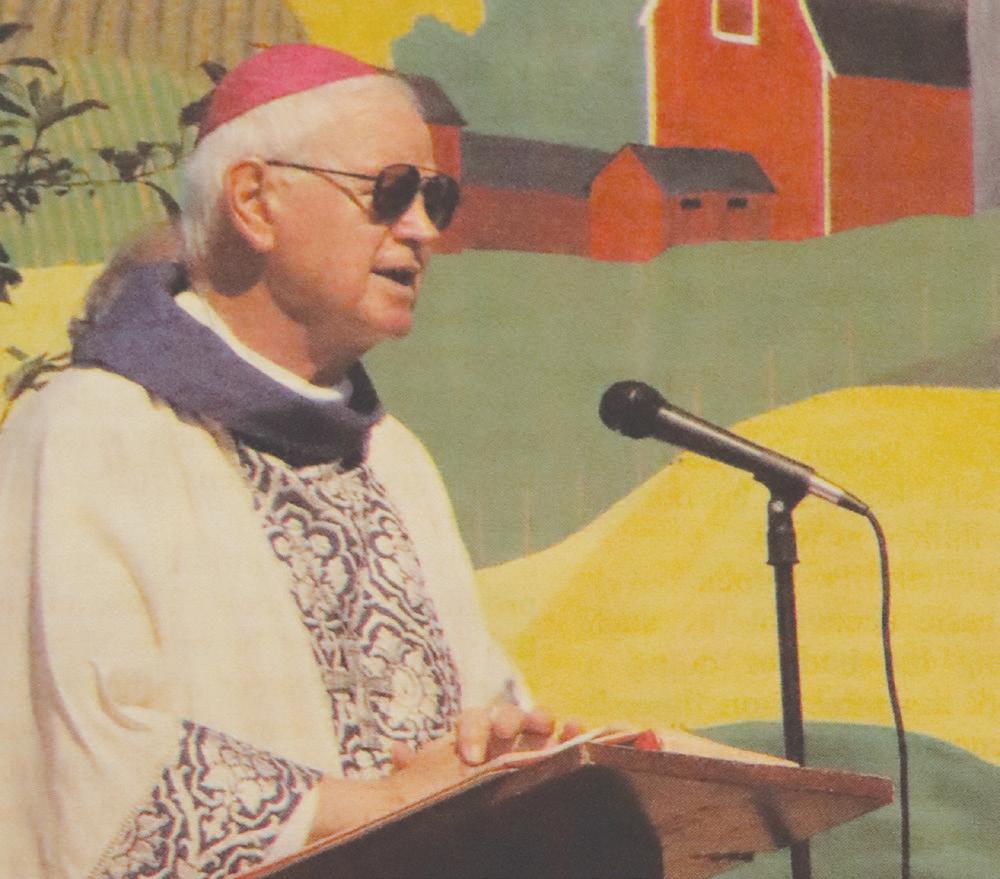

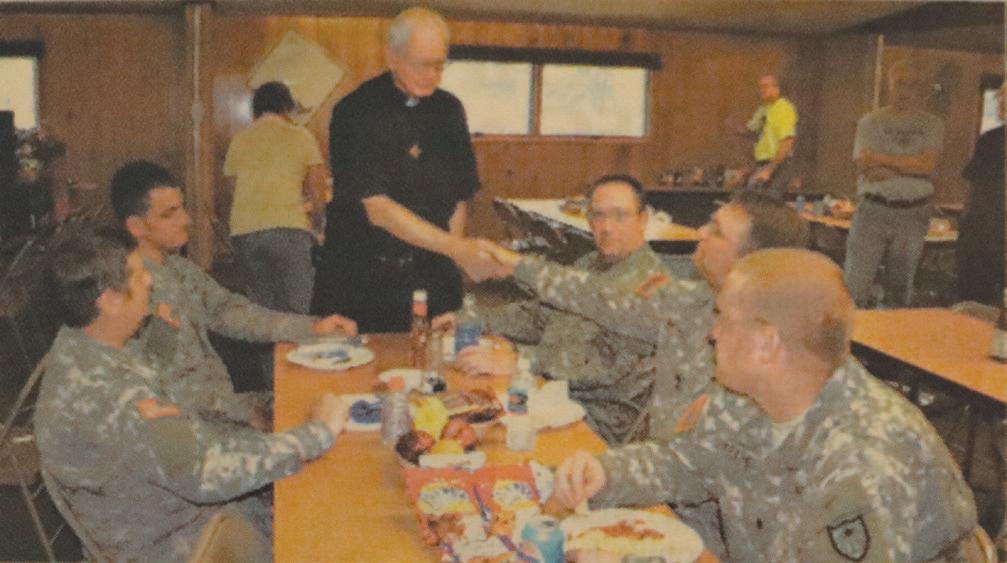
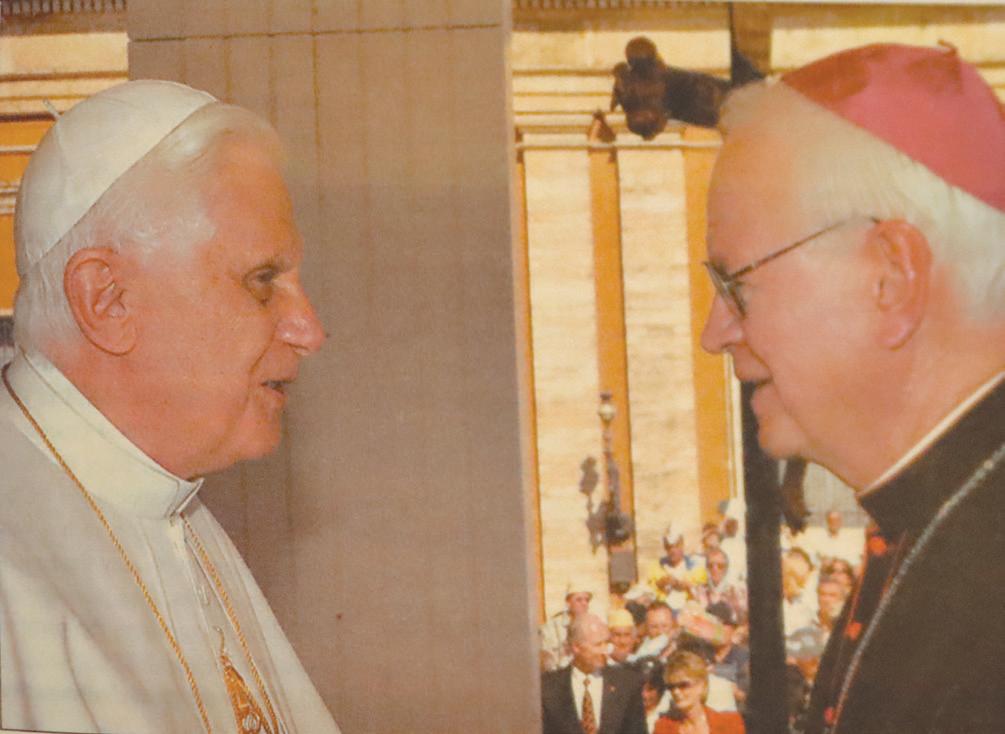
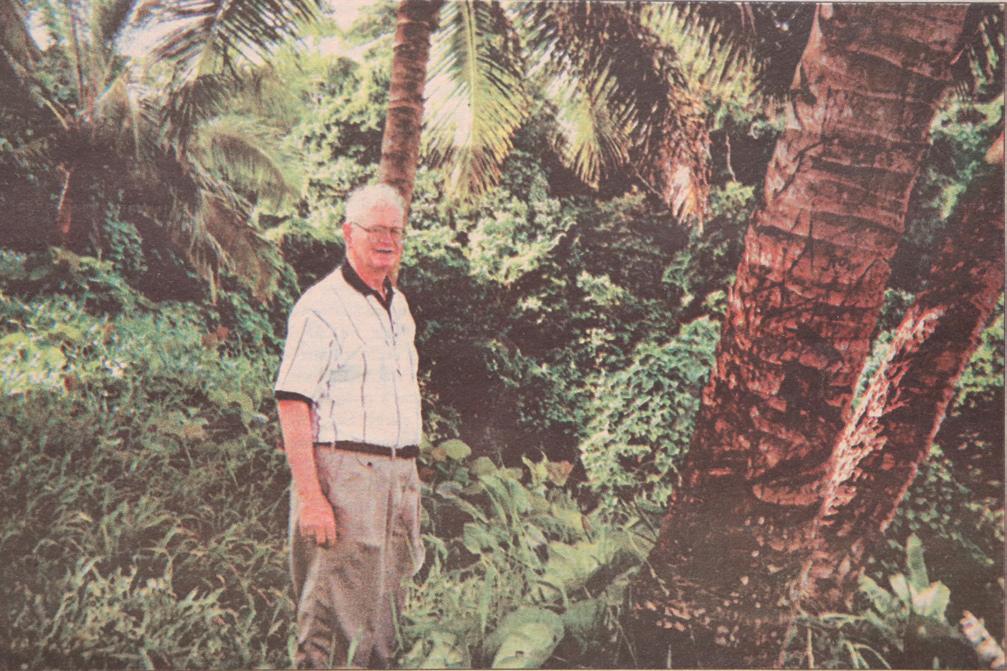
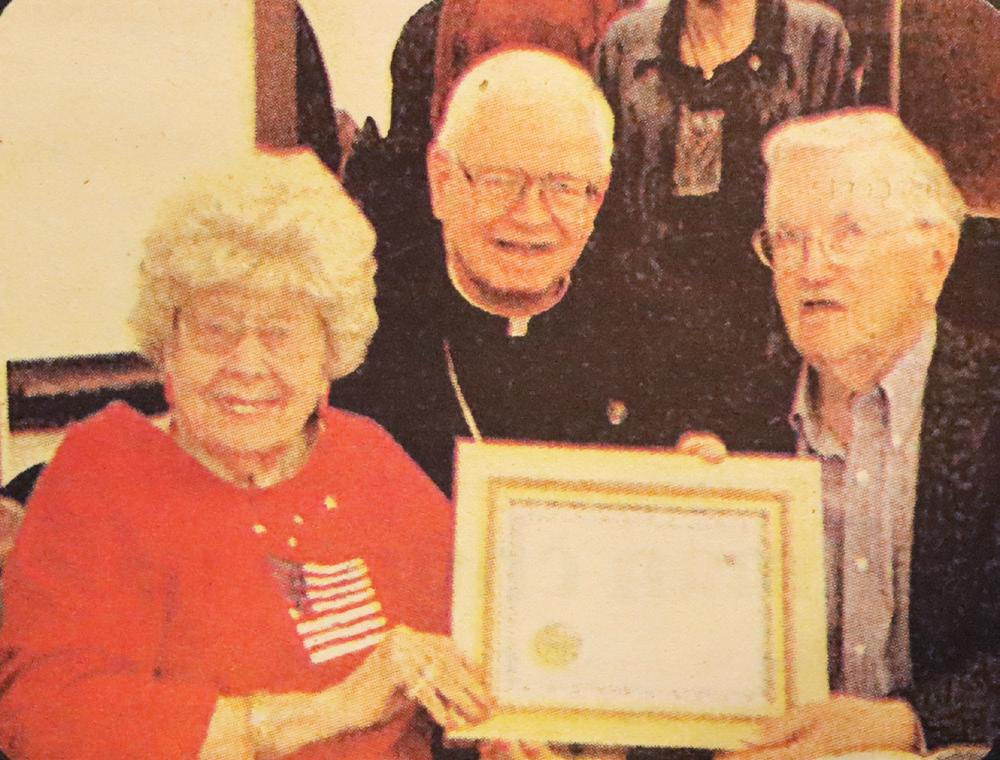
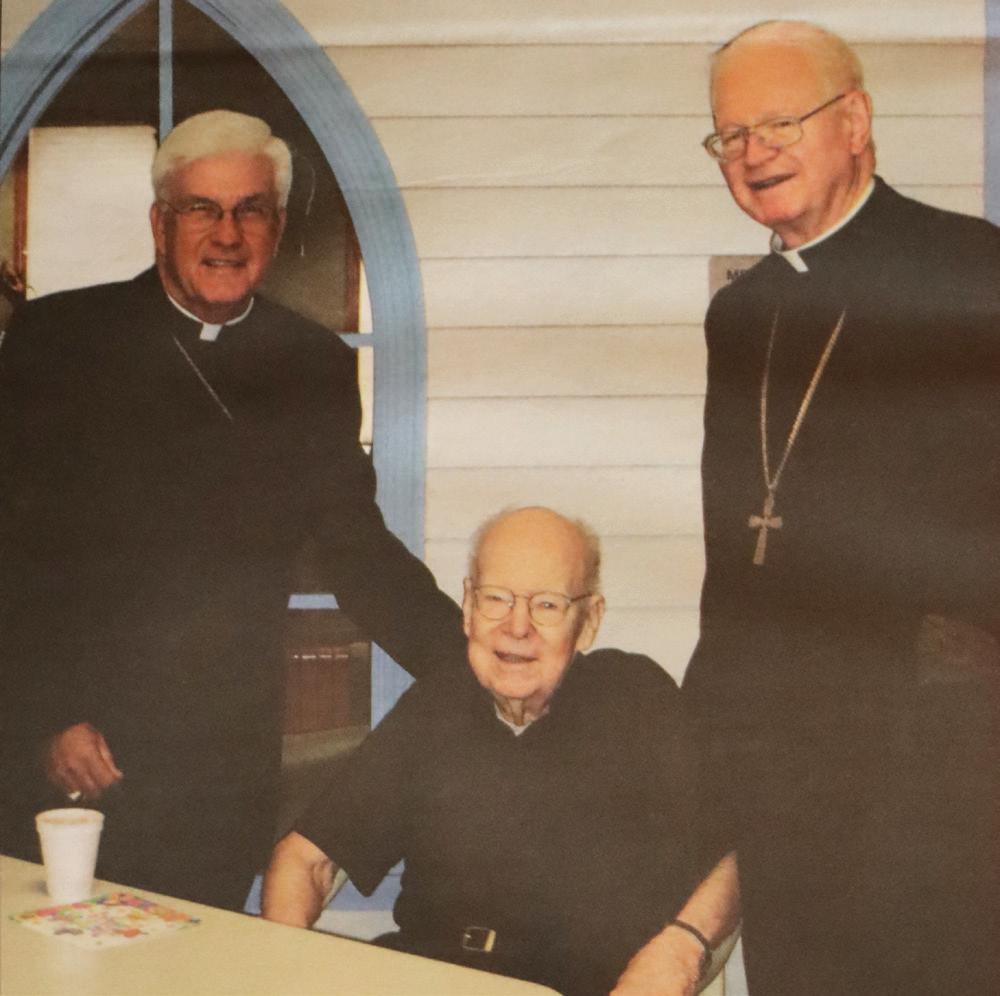
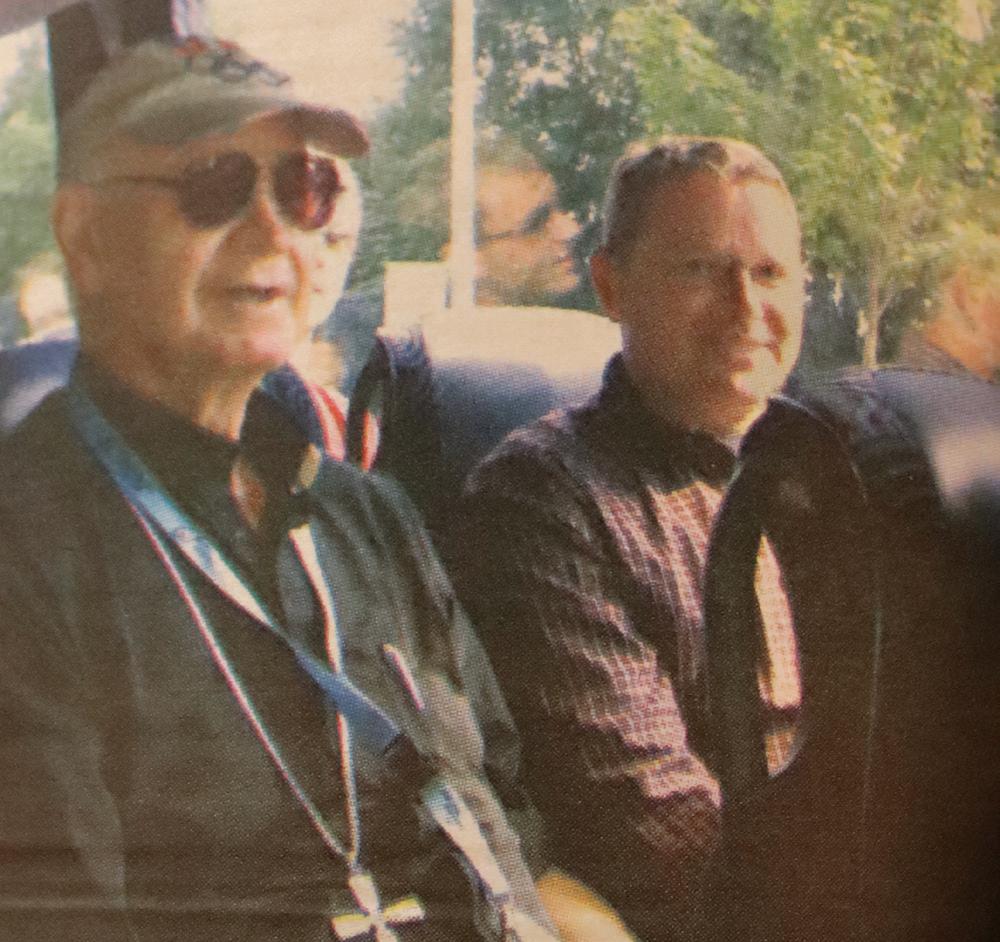
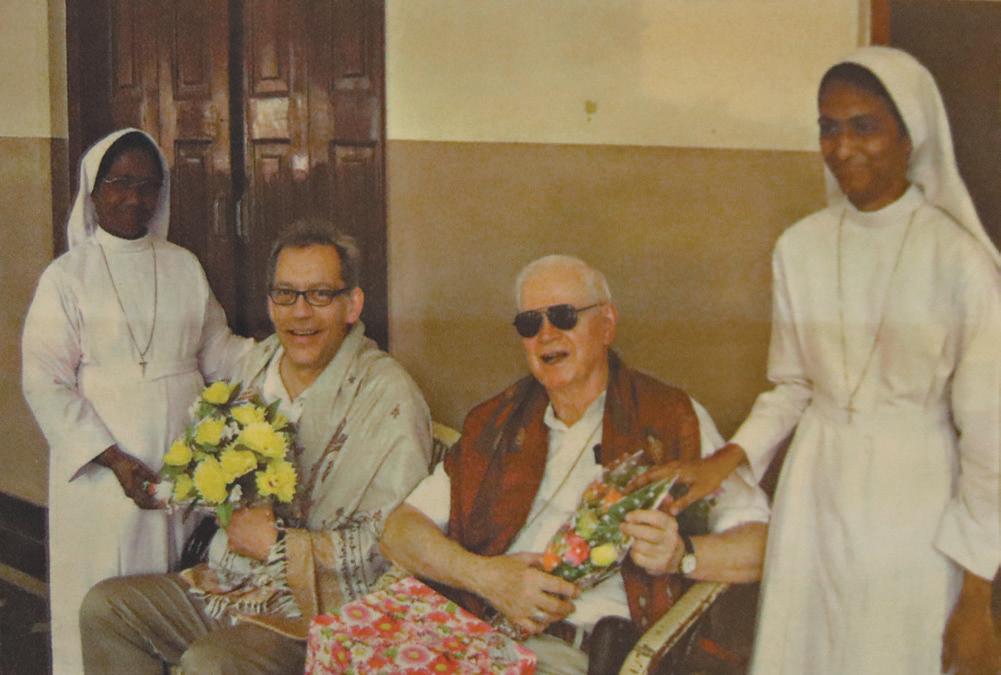
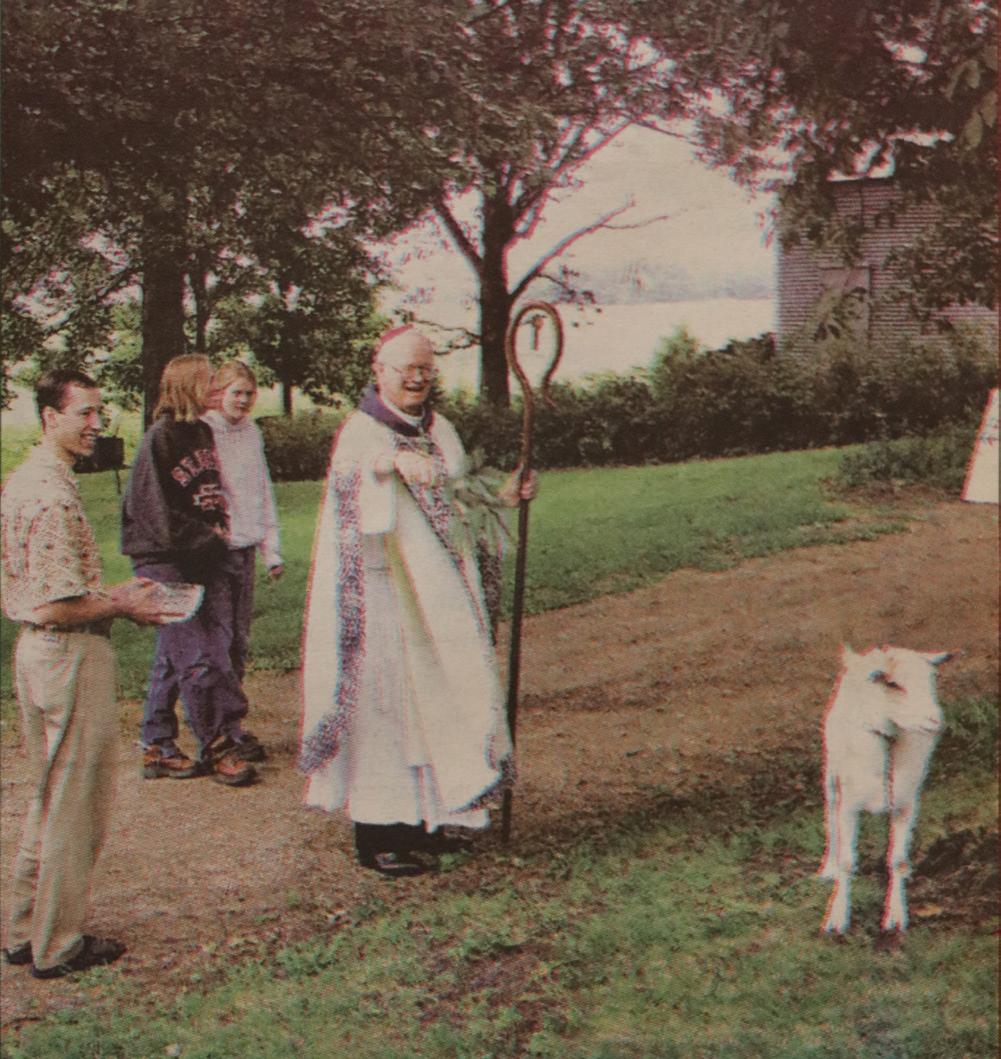

After the Dedication Mass for the newly renovated Cathedral of the Sacred Heart in 2007.
India, 2007.
On a bus in Dusseldorf with seminarian [now Father] Tim Hall, 2005.
Harvest Mass, 2006.
Breaking ground with Fr. Steven Peterson for the expansion of St. Olaf Church, Mabel, 2000.
Vanuatu, 2000.
With Pope John Paul II, 2000.
Marriage Anniversary Mass, 2002.
Blessing a goat after Harvest Mass, 2001.
With Pope Benedict XVI, 2007.
With Bishop Watters (center), welcoming the newly-appointed Bishop Quinn (left).
With the newly ordained Fr. Patrick Arens, Fr. Shawn Haremza and Fr. Glenn Frerichs, 2000.
Thanking national guard members as they eat lunch at St. Joseph Church, Rushford, after the flood of 2007.
Living in Union with the Holy Guardian Angels
By CINDY MEYERHOFER
on October 2, we celebrate the Memorial of the Holy Guardian Angels, first established by the Franciscan order in 1500, and then placed on the General Roman Calendar by Pope Paul V in 1607. On October 2, 1795, Pius VI granted a partial indulgence every time someone reads the Angel of God, my guardian dear prayer.
I first learned about the Consecration to the Holy Angel in 2012 during a three-day mission retreat. Having consecrated myself to Jesus through Mary the year prior, I was naturally attracted to the concept (likely inspired by the Virgin Mary, Queen of all Angels). Although I was initially disappointed to learn it would take more than the 33-Day consecration to Jesus; I still felt a strong desire to fill out the application and enroll in the one-year formation program.
I attended the three-day silent retreat at Christ the King Retreat Center in the fall of 2013 through Opus Sanctorum Angelorum and the Holy Order of the Cross. Following the consecration, I felt my angel nudging me to continue the journey to be consecrated to all holy angels two years later and applied for two additional years of formation to be consecrated to all holy angels, which was completed in 2015.
The last and final step in the journey was a one-year formation to be consecrated to the Confraternity of the order which includes a promise to spread devotion to the angels when given an opportunity to do so. That step had to wait five years as my guardian angel first took me on a little detour to enter a threeyear program to become a certified spiritual director. After making the final consecration in 2020, my guardian angels and the Holy Spirit have prompted an even stronger desire to share this devotion with others. This past year I was able to meet monthly with 19 souls who made their own consecrations.
Observing the impact this devotion has had on others has been a joy, honor and privilege. While attending monthly formation meetings is not a requirement to make the consecration, participants have enjoyed the accountability aspect and hearing how the angels are assisting their proteges each month. The stories are similar to what the angels have always done as mentioned in the bible – provide warnings of danger, help us to understand truth, provide divine protection, prompt us to help others, and help us make good choices.
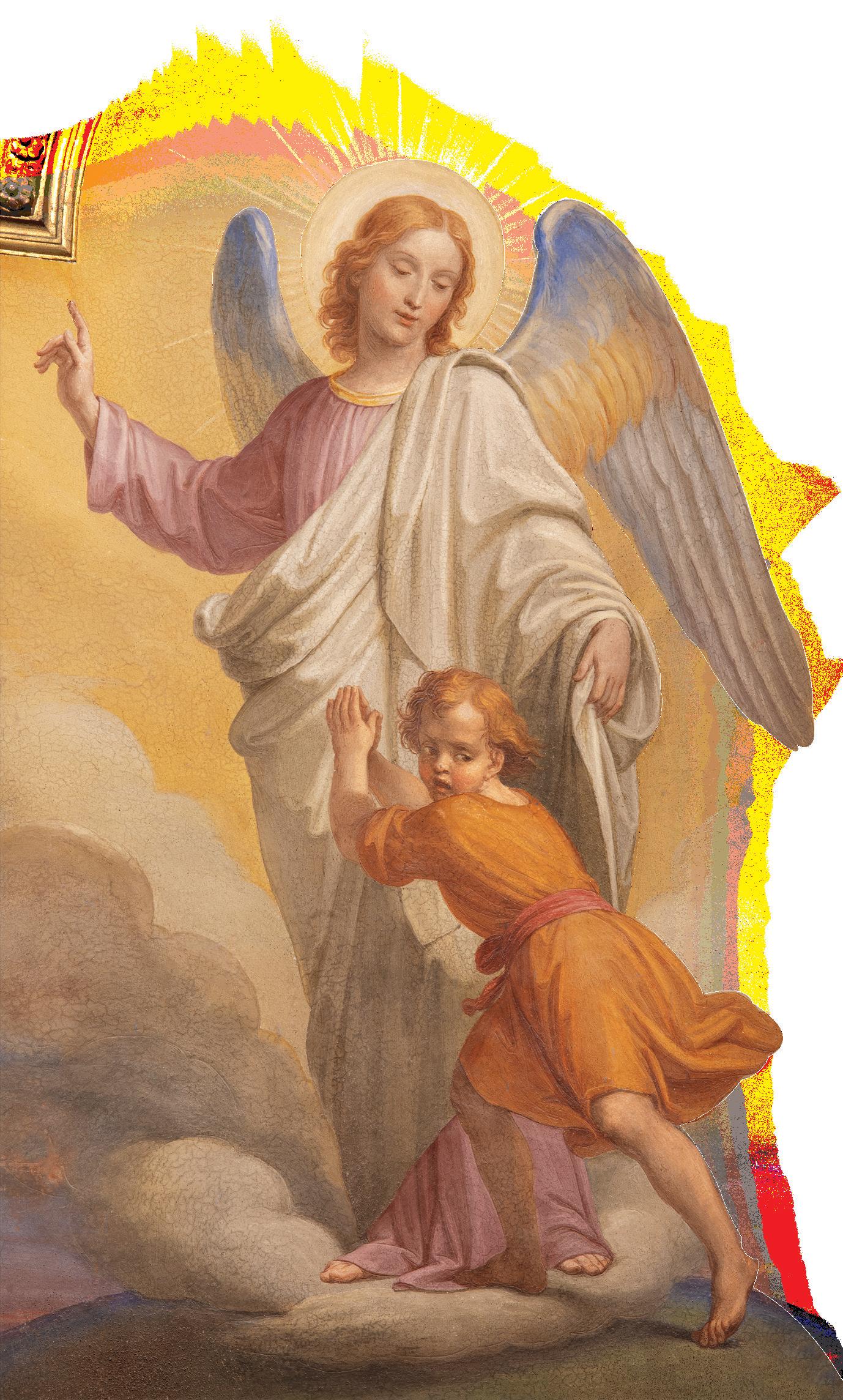
The angels live in perfect union with the Trinity, and consecration helps us conform our will to God’s divine will. I know that my faith has grown and my guardian angel consistently provides the guidance I need to grow spiritually and to be more conformed to Christ through the four fundamental directions of Adoration, Contemplation, Expiation and Mission.
The Opus Sanctorum Angelorum (Work of the Holy Angels) is a Catholic spiritual movement that emerged in 1949 in Innsbruck, Austria, under the inspiration of Gabriele Bitterlich. Focused on fostering a deep devotion to the holy angels and their role in the economy of salvation, the movement has undergone doctrinal scrutiny and reform under the Church's guidance. This article traces the historical development, theological foundations, ecclesial approval, and spiritual distinctiveness of the Opus Angelorum, highlighting its contribution to the renewal of Catholic spirituality through its focus on adoration, contemplation, expiation, and mission.
Introduction
The spiritual relationship between humanity and the angelic world has long been a part of the Christian tradition, rooted in Sacred Scripture and upheld by the Church's Magisterium. The Opus Sanctorum Angelorum, founded in 1949, seeks to actualize this relationship in a structured ecclesial form. Originating with the mystical insights of Gabriele Bitterlich, this movement invites the faithful to embrace a spirituality lived “cum sanctis angelis”- in communion with the holy angels.
Origins and Early Development
The movement began in Innsbruck, Austria, where Mrs. Gabriele Bitterlich, a devout Catholic and mother, received what she perceived as divine inspiration calling for greater veneration of and openness to the help of the holy angels. From 1949, she cultivated a spiritual understanding of the angelic order, always seeking the Church’s approval and remaining in communication with Bishop Paulus Rusch of Innsbruck.
However, as the movement grew, so did ecclesiastical concern regarding certain teachings in Bitterlich's extensive writings. Specifically, the Church identified elements such as non-scriptural angelic names, hierarchies, and functions which it deemed foreign to Sacred Tradition and unacceptable for approved spiritual movements (Congregation for the Doctrine of the Faith, Litteris diei, 1992).
Ecclesiastical Approbation and Reform
Despite early theological concerns, the Church recognized the fundamental intuition behind the Opus Angelorum: the affirmation of angels’ role in salvation history and their assistance to the faithful. By obediently removing doctrinal elements not aligned with Church teaching, the Opus Angelorum received official ecclesial approval, confirming its legitimacy as a Catholic movement.
Its spiritual foundation is now firmly rooted in the Catechism of the Catholic Church (CCC 328–336, 350–352), which affirms angels as spiritual, personal, and immortal beings who serve God and assist His people.
Theological Foundations
According to the Catechism, the angels are “servants and messengers of God” (CCC 329), deeply involved in salvation history. They serve Christ - the center of the angelic world - as He leads both angels and men toward communion with the Father (CCC 331–333).
Importantly, the Church teaches that angels accompany the faithful from birth to death (CCC 336), and their role in the liturgical life of the Church is both real and active (CCC 334–335). These doctrinal affirmations underpin the spirituality promoted by the Opus Angelorum.
Consecration to the Holy Angels
What distinguishes the Opus Angelorum from other Catholic spiritual movements is its practice of “consecration to the holy angels.” Much like consecration to the Sacred Heart of Jesus or the Immaculate Heart of Mary, this act is a personal covenant with one’s guardian angel, acknowledging their mission and place in God's salvific plan.
This consecration expresses a desire for deeper collaboration with the angels in living the Gospel and participating in the Church’s mission. As St. Thomas Aquinas affirms, friendship with the angels is possible through faith and charity (Summa Theologiae II-II, q.25, a.10), thus enabling this spiritual partnership.
Angels,
cont'd from pg. 12
Spiritual Dimensions: Adoration, Contemplation, Expiation, and Mission
The Opus Angelorum emphasizes four pillars:
• Adoration: Particularly Eucharistic adoration, reflecting the angels’ unceasing worship of God and inviting the faithful to join in that heavenly liturgy.
• Contemplation: Aided by the angels, members seek to deepen their understanding of God and His works (theologia et oikonomia, cf. CCC 236).
• Expiation: In imitation of Christ, members engage in acts of reparation for sins, especially through participation in the weekly Passio Domini devotion, commemorating Christ’s Passion.
• Mission (Apostolate): With the angels’ help, members are strengthened to evangelize and serve the Church, especially through prayers for priests and the sanctification of souls.
Discernment and Spiritual Maturity
Because the relationship with angels involves spiritual sensitivity, members are urged to develop discernment of spirits, ensuring their experiences align with Scripture and the Church's teaching. As noted in the Compendium of the Catechism, the angelic world invites a “continual conversation” between heaven and earth, one that calls the faithful to “sharpen their spiritual ear” for the voice of God’s messengers (Compendium, p. 178).
The Author of Our Lives
By DEACON ROBERT YERHOT, MSW
god alone is the author of our lives. He writes every word in every chapter. Our lives are true and beautiful because they speak of God’s will. While, for many of us, our lives seem to be the unfortunate results of random events beyond our control or desire, in fact, God has willed all that happens in our lives. Every detail. The good things he has directly willed for us; the not-so-good things he allowed to occur so as to redeem those things and use them to better carry out his plan for us and for the whole world. Yes, everything has a place in God’s plan for us and the whole world. God has known every detail of our lives from all eternity. Will we let God write the book of our lives and reveal its meaning when he sees fit?
We all know people who suffer greatly from a variety of illness. We are tempted to conclude it is all so unfair and unfortunate. God, I believe, is calling forth something beautiful from it. God is calling forth from us a deeper faith. Illness challenges all of us to see God’s presence and love more readily. Through illness, do we not hear Jesus asking: “Do you love me? Do you trust me and my plan? I am doing some-
Synod, cont'd from pg. 1
ballots, along with facilitator notes from each session of the Synod, will serve as the foundation for the Bishop’s Pastoral Letter, which will be published along with an implementation plan at the beginning of Advent.
What does it mean for the majority of us faithful?
What effect will it have for parishes?
Rest assured, the aim of this whole project is not simply to give pastors and leaders more to do, but together to travel “further up and further in;” to reawaken the wonder at the fact that God loves us, He gave His life to save us, and now is living at our side every day to enlighten, strengthen, and free us.
thing wonderful here. Do you not see it?”
For several decades, I worked with men and women who were being treated for schizophrenia. They were my patients, and I grew to respect the courage many of them had in living with this devastating illness. Life was hard work for them. They worked much harder at life than many of us do. One of these people was a woman with whom I worked for 20 years. At the end of my last session with her, I said to her, “You have suffered much in your life. You know the crucifixion well and haven’t yet to experienced the resurrection.” To my surprise, she shook her head in disagreement. She said her life was not just suffering. She saw it as a life lived for the betterment of her family, and she was at peace with that. In that, she had experienced a sort of resurrection. That statement was a learning moment for me, and a gift she gave me. Her life mirrored the life of Jesus. Just as his suffering was lived for the betterment of the world, hers was lived for the betterment of her family. Just as Jesus willingly laid down his life for all of us, she had lived her life for her children.
At every moment of every day of life, God holds your life in his hands, willing you to live. Over and over again without ceasing, God wills you to live.
Rediscovering the priority of this reality is an opportunity that can be lived out in many different ways. Put another way, we’re less concerned about programmatic changes than we are about reorienting ourselves around our evangelical mission and identity. Much like the Eucharistic Revival, we’re seeking to revivify zeal in our diocese. Again, we’re not after programs, but a fire in the hearts of the faithful.
More precisely, we now have an opportunity after the example of the diocesan assembly to live the synodal “style” or “attitude” in our parishes. When Pope Leo XIV stepped out on the loggia earlier this year, he greeted the faithful with a greeting of peace – specifically, “a disarmed peace, a disarming peace.” Without question, peace has proved to be one of the foundational themes of this pontificate.
Peace in our world. Peace in our hearts.
Might I suggest that this is directly related to synodality? Indeed, it's an interpretation that - if you've been paying attention - is sorely needed right now.
Conclusion
The Opus Sanctorum Angelorum, through its devotion to the holy angels, provides a unique and deeply theological spirituality within the Church. Its emphasis on divine worship, intimacy with the angelic hosts, and fidelity to ecclesial teaching makes it a notable example of post-war Catholic renewal. Having undergone significant doctrinal clarification, it stands today as a Church-approved movement oriented toward adoration, sanctification, and evangelization - “with the holy angels,” always in the service of God’s glory and the salvation of souls.
Cindy Meyerhofer is the director of human resources for the Diocese of Winona-Rochester.
God has given life to you and he never takes it from you. No, he gave you eternal life at baptism. He will sustain that life forever.
We live in a world that cheapens human life. We live in a world that takes life from people rather than giving it. We live in a world that does not see the deeper realities, the hidden mysteries. What are those mysteries? That God uses the weak, the childlike, the poor, and the sick to reveal his presence and his plan for the entire world.
May God richly bless you. You have reason to hope that you will someday see God face to face, when every tear will be wiped away, every question answered, every hope fulfilled, and every reason known. You have only to remain faithful to him. You have reason to hope that you will rest in peace, after having heard the words, “Well done, good and faithful one. Come now into your eternal home.”
Deacon Robert Yerhot is the director of the diaconate for the Diocese of Winona-Rochester.

Upon encountering the Risen Christ, the living God, what does it mean to be “disarmed” and “disarming” in our peace?
At the risk of sounding cliché, allow me to offer the following simple suggestion as a start. Perhaps it can be an invitation to respond to the crises of our time with Christian charity and mutual respect, to listen to those who think differently from us without immediately looking for hidden agendas, or applying labels, or hurling insults, or assuming the worst, or doing or saying things that we can't take back. Perhaps taking on an attitude of listening to radically different viewpoints and engaging with those our “tribes” deem unengageable can help us dissociate from vice and make a real, palpable difference in our homes, parishes, diocese, and world.
The style of synodality may be precisely the salve we need, not only to direct our local church, but to help heal a world in desperate need of peace.
Brian Kusek is the director of evangelization for the Diocese of Winona-Rochester.
14 Meet Our New Seminarians!
this fall, the Diocese of WinonaRochester welcomes four new seminarians discerning priesthood for our diocese. Please pray for ALEX DANIELSON, JUAN ROMAN GALVEZ, DAVID OOLMAN, and ZACHARY SCHMITZ as they discern God's plan!
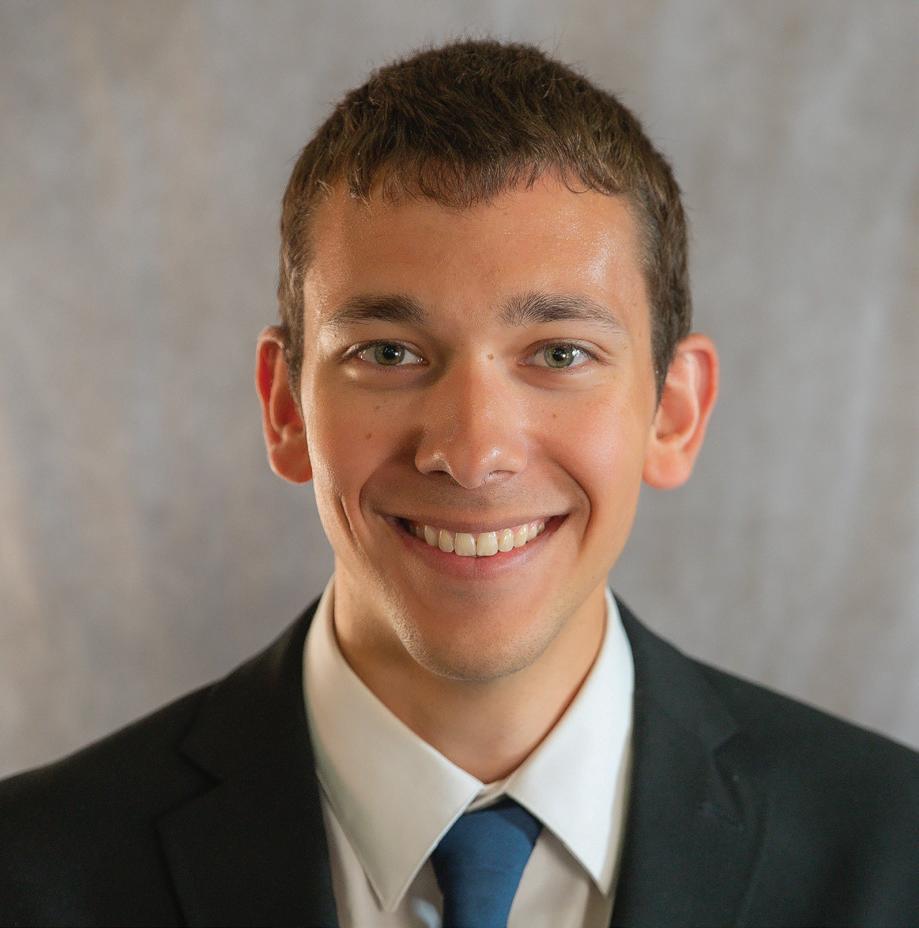
Alex Danielson
My name �s A�ex Dan�e�son, and I am from La Crescent. My hobbies include fishing, distance running, playing cards and board games, and reading. God has certainly blessed my family, as I was born with a brother and a sister at the same time. That’s right, I am a triplet! While I still find it annoying to have to share a birthday with them, being a triplet has taught me how to get along with others from an early age while also engaging in friendly competition. I have another sister who is six years younger than me.
Since I was a child, I have attended Crucifixion Catholic Parish in La Crescent. I also attended Crucifixion School. My time at Crucifixion gave me a great introduction into the Catholic faith as I learned many skills such as how to pray the rosary and how to be an altar server at Mass. I am incredibly grateful for the amazing teachers, staff, and students at Crucifixion who have helped me to form the foundation of my faith.
After the sixth grade, I attended La Crescent Middle School and La Crescent High School, where I was involved in many activities, such as soccer, track & field, math team, and jazz band (where I played the trombone). While my interests in various activities flourished, my faith life had begun to decline as I had spent little time in prayer outside of Mass. Despite this, I still attended Mass every Sunday and was confirmed in the tenth grade.
Upon graduating from high school, I attended the University of Wisconsin, Platteville, to study mechanical engineering. While I loved engineering, received high grades and made plenty of friends, I could tell that something important was missing from my life. After years of minimal prayer, I decided to pray to God about what I should do. My prayer was quickly answered when, the following Sunday, a FOCUS missionary asked me to join a bible study. Despite never having been a part of a bible study before, I felt that God was asking me to say, "Yes," so I graciously accepted. Bible study rekindled my love
of God to the point that I was saying, "Yes" to any invitation to become closer to him. This included joining a discipleship group, joining a second bible study, leading my own bible study, altar serving at Mass, and joining the Knights of Columbus. By the time I graduated from Platteville, I was attending daily Mass and adoration.
The idea of becoming a priest was absent from my mind until my last year of college. One day after Mass, I noticed a free pamphlet sitting on a table that said: “Is Jesus calling you to be a Catholic priest?” I realized that I had never asked myself that question before, so I decided to give it a quick read. In that moment I had an intense moment of grace, which led to months of prayer and learning about the priesthood. I noticed how my heart had changed from desiring worldly things to desiring a relationship with Jesus. From there, I applied to the seminary and was accepted, all thanks to God.
My best advice to anyone discerning their vocation would be to focus on growing in their faith and intimacy with God before diving deep into discernment. I personally needed a ton of spiritual and human growth before I was able to see how God was working in my own life.
I have nothing but joy about the journey that God has put me on. While it will be a long one, I am excited to see how God will use me to benefit others.
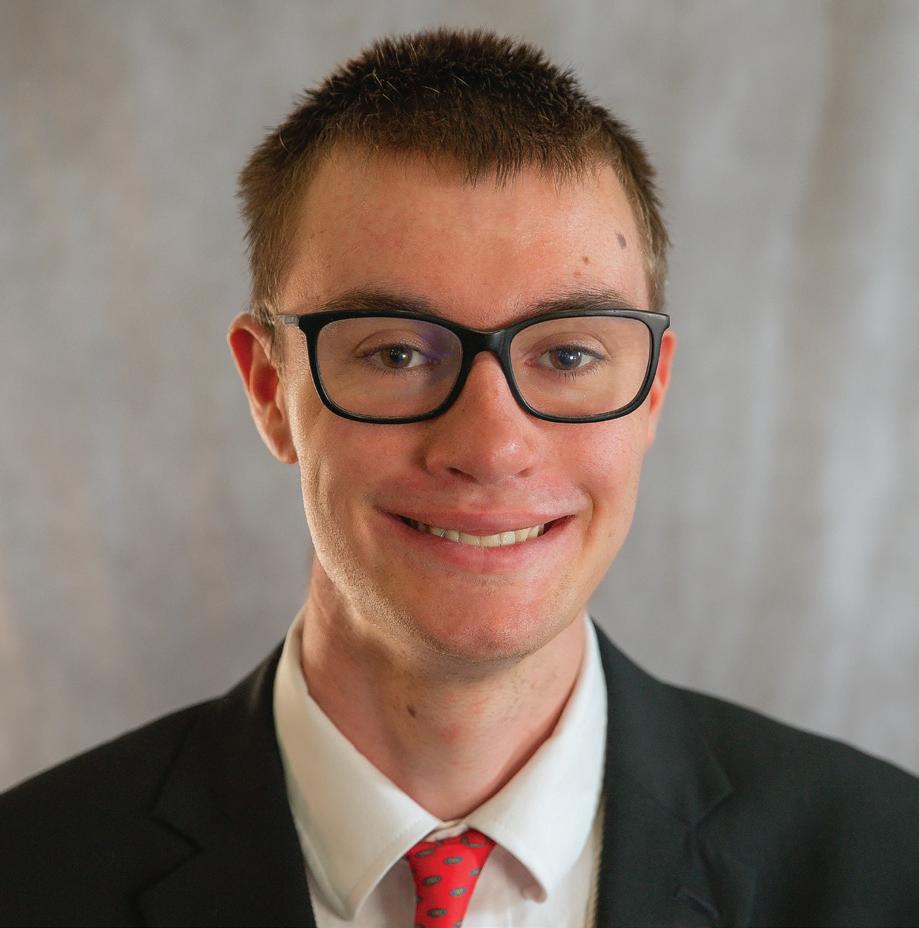
David Oolman
B�othe�s and s�ste�s of the Diocese of WinonaRochester, my greetings to you all! May you experience the love Jesus Christ has for each of you as you encounter him in prayer and in the greatest form of prayer - the Mass! My name is David Oolman, and I am from Holy Family Parish in Kasson. Some of my hobbies include playing video games, reflective writing, and reading. Growing up, I was exposed to both the Catholic and Lutheran faiths because my mom is Catholic and my dad is Lutheran (specifically the Missouri Synod). This made life fascinating, as, on Sunday mornings, we either went to my dad's church or my mom's church. Interestingly enough, it was seeing a pastor like the one at my dad’s church that first caught my attention. Despite the different denominations, my two siblings and I were baptized Catholic. However, the Catholic Faith never really became a priority for me, and I almost left the
Catholic Church to become Lutheran like my dad. Yet, the Lord had different plans, and in my junior year of high school, I attended a TEC (Together Encounter Christ) retreat, which opened my eyes for the first time to the beauty of the Catholic Church and all she has to offer. That was when the idea of the priesthood first came to mind.
Even after the initial thought of the priesthood, it resurfaced a year later. But, once again, I pushed it away. After graduating from Kasson-Mantorville High School, I decided to attend Bethel University in St. Paul. It was here in the Archdiocese of St. Paul and Minneapolis - and with the help of the parish of St. John the Baptist in New Brighton - that my faith flourished. The Catholic Faith became something not just abstract, but tangible and possible to live out.
Over the past two years at Bethel, I found the Church more inviting than ever. The question of how to serve her was the last major concern, and the only thing that made sense was the priesthood. However, one couldn't fully pursue the priesthood without being in seminary. It was during my visit to IHM Seminary in late April that the Lord showed me he wanted me there. I eventually applied and was accepted in late June. Needless to say, the application process had its struggles, including the challenge of giving up my degree I had been pursuing for the past two years. But, as Father Kern said, I "threw it away, joyfully."
Since moving in on July 12, the biggest joys I have experienced are the deep sense of “peaceful joy” and the bond among us brothers. Even when I served for the first time, nerves appeared, but they remained manageable. Seeing the Mass from a completely new perspective only made me love it even more! (The Lord said to me after serving, “The angles only get better from here!”) The joy and peace from serving began to influence other areas as well - the brotherly community, the Mass, doing the dishes, and even at the start of learning Latin.
That being said, seminary isn’t always “sunshine and roses.” Difficulties arise from learning to balance the seminary life on top of the already busy demands college asks of you. With a house job, meeting with others on formation, counseling, and soon-to-be-added spiritual direction, studying, and doing homework, it really adds up. Another difficulty has been learning Latin (new languages are not my strong suit)! As I write this, it is still early in classes, but I know it is part of the cross Christ is asking me to bear!
My advice to those who are on the fence for any reason is to know everything will be okay! Start by saying yes to the Lord in small things. This could mean doing chores, completing homework you’d rather avoid, or spending ten minutes in prayerbegin small! Eventually, he may ask you to take a slightly bigger step, such as reaching out to that vocation director or religious order. By then, it may become easier to say yes. Just say yes and trust that the Lord will guide you in whatever he asks you to do!
Know the love Christ has for me, I have for you! Please know that I am thinking of you in prayer. If there are any specific prayers you would like me to offer, please let me know. Thank you for your prayers as I go through seminary - it is greatly appreciated. May God continue to give all his blessings and grace he is willing to provide you as you live out your call (in whatever that may be)!
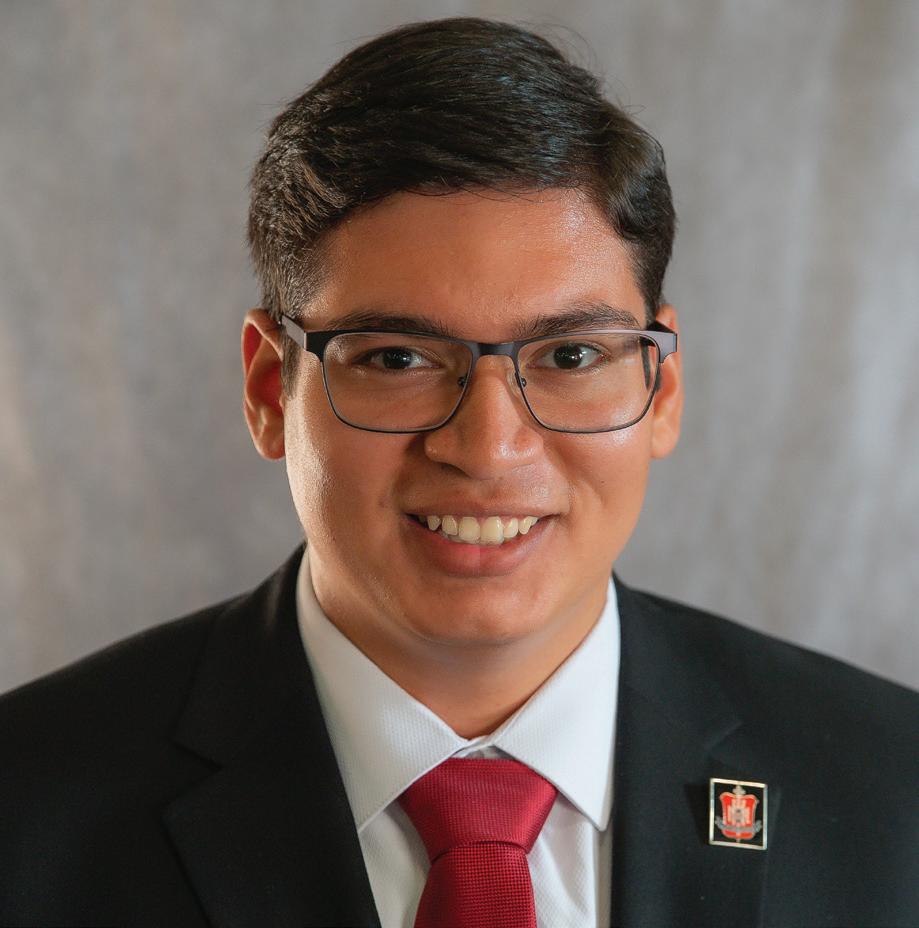
Juan Roman Galvez
He��o, B�othe�s and S�ste�s! I'm Juan David Roman; I'm 22 years old. I’m a new seminarian for the Diocese of Winona-Rochester. I was born and raised in Guatemala, in the state of Escuintla (I came to the states three years ago). I was raised in a Catholic family and attended a Catholic school in my hometown; the school is dedicated to Mary Help of Christians. For the last three years, I have been living in Rochester with my parents! As a curious fact about me, I attended the National Major Seminary of the Assumption of Mary in Guatemala for two years. (This happened in 2021.) Unfortunately, I had to leave my process in the seminary and move to this country for security reasons.
I remember in fifth grade during holy hour, I could feel something in my heart while I was contemplating the Most Holy Sacrament of the Altar, at that moment I didn't understand what was happening, but as the years went by I could understand that God was calling me to something.
I am now a seminarian for the Diocese of Winona-Rochester. I was overjoyed when I received my acceptance letter from Immaculate Heart of Mary Seminary (IHM). At that moment, I understood again that all of this was God's will. I was simply trying to respond to his call. I feel great joy in my heart by being a seminarian again. These past few months since I entered the seminary have been an incredible experience so far. I'm enjoying this new mission God has called me to follow.
My greatest influence on my faith was, and continues to be, my grandparents, Juan and Maria Galvez. For as long as I can remember, they taught us the love of God, that God is and always will be the answer to everything, and that everything we do in our lives should be to honor God. I remember attending Mass with my grandparents when I was a child; that will always be the best memory I will cherish in my life. I love sports and poetry. My favorite sports are basketball and volleyball; and my favorite poem is "I Thirst for Love" by St. Therese of Lisieux. The advice I would give to someone trying to discern God's will would be: “Don't be afraid to answer God's call, don't be afraid to look with love at Christ on the Cross who says to you, "Come, follow me." Dare to follow the Lord; he will take you to unknown places.”
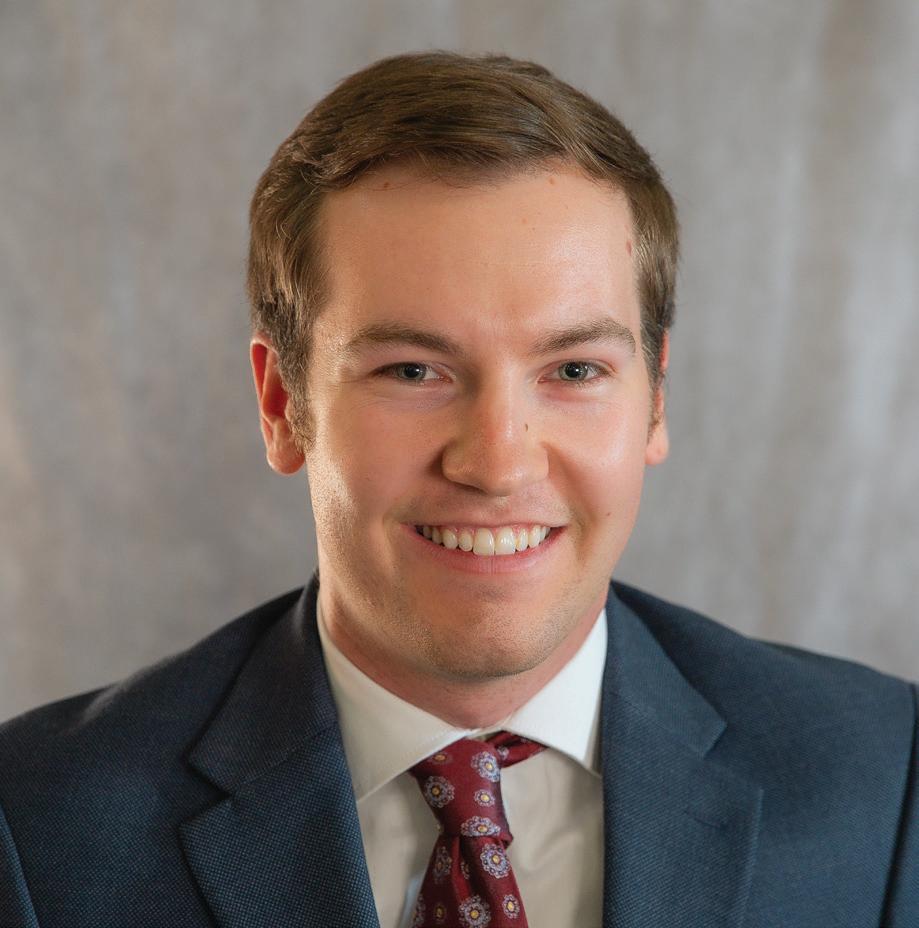
Zachary Schmitz
He��o, eve�yone! I'm Zachary Schmitz and am currently in the propaedeutic [introductory] year for formation up in St. Paul. I grew up in St. James as the youngest of five boys on the southwest Minnesota countryside. Some of my hobbies and interests are deer hunting, reading, coding, playing guitar, and journaling. The first call I received to discern priesthood came during my junior year of high school, a few months after being set on fire for the faith at a Steubenville conference in Rochester. In order to pursue other paths, I opted to avoid following the
call. Before the Steubenville conference in Rochester, the Catholic faith was for the most part habitual rather than a faith lived well; I did not understand and desire to live the faith. After my encounter with Christ in adoration at the Steubenville conference, I began to take an interest in the faith and desired to learn everything I could, frequent the sacraments, read the lives of the saints, delve into Church history, help teach faith formation, talk about the faith with family members and classmates in school, and develop a deep prayer life.
The strongest influences on my faith life are my parents, my sister-in-law Dana, and my parish priest, Fr. Timothy Hall. I've learned quite a bit from their examples, such as the importance of consistency with holding to Church teaching and trusting in God's plan for your life even when the future seems obscure.
While growing in the faith in my late teens, other paths opened up besides priestly discernment. I studied electrical engineering at South Dakota State University and worked a variety of jobs after graduating before finally visiting IHM earlier this year, applying to the diocese, and entering the Damascus House for a year of formation.
Being in the propaedeutic year for the first two weeks so far has been a big blessing. The tech fast, rule of life, and fraternity have been the most formative aspects of the adventure, and I am looking forward to continuing my journey in spiritual and human growth. I am grateful for the amount of positive support received from family and friends upon acceptance to the propaedeutic year. Some of the joys I have experienced so far are growing close to God in daily Mass and Holy Hour, as well as building new friendships with other Catholic men from the upper midwest and western United States. In addition to the deep prayer life and fraternity, I've been learning more and more about the faith everyday, deepening my knowledge of the faith, which in turn strengthens my relationship with Christ.
A word of advice for any young man discerning priesthood; go to the come-and-see weekend to see what seminary is like and build a strong prayer life in adoration. In the silence we hear God's voice, which is crucial in our world full of noise. Also, a devotion to our Mother, the Blessed Virgin Mary is a great help. Above all, trust in God's plan for your life!
Understanding Our Seminarian Appeals
By MARK DOCKERY
as the director of stewardship and development for the Diocese of Winona-Rochester, I often hear the same thoughtful question: “What’s the difference between the Catholic Ministries Appeal, the Seminarian Education Appeal, and the Hearts on Fire Appeal? Don’t they all help support seminarians?”
The short answer is yes! Each appeal supports our seminarians in different and complementary ways.
The Catholic Ministries Appeal (CMA)
The CMA is our annual diocesan appeal, supporting the day-to-day ministries of the diocese - programs
and services that touch every Catholic across our 20 counties. Your gifts help fund:
• Education & Youth - Catholic Schools, Youth Ministry, Family Life, and Faith Formation.
• Evangelization & Mission - The Courier, TV Mass, Social Media, our Diocesan Website, and Campus Ministries at Newman Centers in Winona and Mankato.
• Community Service - critical financial support for Catholic Charities.
• Parish Services - Parish Financial Services, Cemeteries, Worship, and Hispanic Ministries.
• Clergy Services - Care for our priests, both active and retired.
In other words, the CMA helps the whole Church family thrive.
The Seminarian Education Appeal
This appeal directly helps our seminarians by providing tuition assistance.
The journey to the priesthood is long, typically spanning 7–9 years of formation and study. For those entering right after high school, the path looks like this:
1. College Seminary (4 years): At Immaculate Heart of Mary Seminary (IHMS) in Winona, our men complete the Propaedeutic and Discipleship stages while earning a degree in philosophy from St. Mary’s University.
Endowments What They Are and Why It Matters
By ELIZABETH WILLIAMS
are you familiar with an endowment? Imagine a gift that gives in perpetuity! It's true and it is possible. And many parishes throughout the Diocese of Winona-Rochester already have one with us!
If you're new to endowments, I've put together a few of the basics for you.
What is a Parish Endowment?
An endowment is a permanent, invested fund that generates income year after year. It’s a lasting financial foundation that supports your parish’s mission, ministries, and maintenance - today, tomorrow, and for generations to come.
How? It's possible to see income annually from an endowment because the original principal, or corpus, is never spent, while the earnings from investments are used year after year to support the organization’s mission.
Think of it as planting a tree:
• You don’t chop it down - you protect the trunk (the principal or corpus).
• You harvest the fruit - the earnings, which can be used for scholarships, ministries, building maintenance, salaries, or other needs.
• It keeps producing year after year, ideally forever if well stewarded.
Why It Matters
An endowment...
• Sustains the Mission: Regular disbursements help fund liturgy, education, outreach, and pastoral care - even during economic downturns.
• Reduces Dependence: Less reliance on weekly collections and capital fundraising means more freedom to focus on ministry.
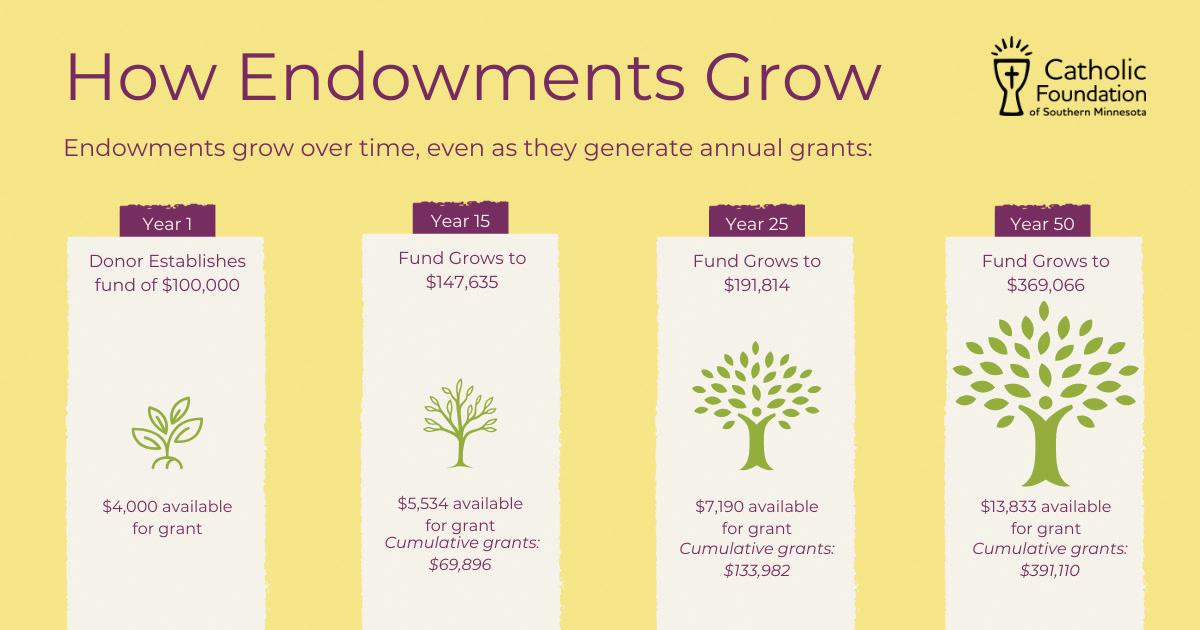
Seminarian Appeals,
2. Major Seminary (4 years): Next comes theological study at St. Paul Seminary (St. Thomas University), Rome, or, for two of our students, at Mundelein Seminary in Illinois, with tuition provided by a generous benefactor.
3. Vocational Synthesis Stage (6–12 months): Here, men serve as deacons in parishes, apprenticing under a pastor before priestly ordination. We currently have three deacons - Riley Becher, Cullen Gallagher, and Adam Worm - who, Godwilling, will be ordained priests in June 2026!
The cost of educating one seminarian exceeds $45,000 annually. The Diocese of WinonaRochester currently has 24 seminarians in training, with education expenses totaling over $1 million each year. The Seminarian Education
cont'd from pg. 15
Appeal raises approximately $280,000 annually - so there is always a greater need, especially as our numbers increase.
When Bishop Barron arrived, he challenged us to double the number of seminarians. We’ve already grown from 20 to 24, and we’re praying for even more!
The Hearts on Fire Appeal
Finally, the Hearts on Fire Appeal is run directly by Immaculate Heart of Mary Seminary in Winona. It provides the largest share of funding for the seminary itself - covering room and board, maintaining the campus, and supporting daily seminary life. Simply put, IHMS couldn’t operate without it.
• Supports Future Generations: Endowments ensure a stable future for your parish’s children and grandchildren.
• Honors Legacy Giving: Endowments offer a meaningful way for parishioners to leave a legacy aligned with their values and faith.
Let's Talk Numbers
Let's take it a step further with how? Can an endowment really serve a Catholic organization in perpetuity?
The answer is a resounding yes! If you work with a fiduciary like us to care for your funds, the image below shows what a $100,000 endowment could look like in 50 years: Over $13,000 in annual grants with nearly $400,000 granted cumulatively. And $369,000 is still in the bank.
How We Help
At the Catholic Foundation of Southern Minnesota, our focus is serving local Catholic organizations to the benefit of local Catholics. This past fiscal year, we distributed nearly $320,000 through 392 individual grants across 42 cities in our diocese. What a blessing to pour into Southern Minnesota, thanks to the generous donations of those who came before us!
As another part of serving our Catholic community, we offer no-cost planned giving seminars annually for all parishes that invest with us, helping you to educate parishioners on how to plan for legacy giving like endowments. Then when it's time to receive an endowment from a parishioner, we have templated contracts you can use and then we hold the funds until you're ready to have them distributed.
Interested in learning more? Reach out today.
Elizabeth Williams is the executive director of the Catholic Foundation of Southern Minnesota. She can be reached at 507-218-4098 or info@catholicfsmn.org.
Working Together
Each of these appeals plays a unique role. The CMA strengthens diocesan ministries, the Seminarian Education Appeal supports the men in formation, and Hearts on Fire sustains the seminary. Together, they ensure that our seminarians are well-formed and that our diocese has the priests we need for generations to come.
If you’d like to learn more, I’d be happy to talk with you! Please reach out to me.
Mark Dockery is the director of stewardship and development for the Diocese of Winona-Rochester. He can be reached at 507-361-3364 or mdockery@ dowr.org.
Statement from MCC
Executive Director Jason Adkins on Calls for a Special Session to Address Gun Violence
SAINT PAUL - On Friday, September 5, 2025, Jason Adkins, Executive Director of the Minnesota Catholic Conference, issued the following statement in response to calls from Governor Tim Walz to reconvene a special session of the Legislature to address gun violence in the wake of the Annunciation Church tragedy:
In the wake of the tragic shooting at Annunciation Catholic Church and School, the Minnesota Catholic Conference (MCC) welcomes a broader legislative discussion about preventing gun violence. While a special session focused only on gun regulation may address part of the problem, it is insufficient if it ignores other urgent concerns, particularly equitable school safety funding for all students, including those in nonpublic schools.
The Catholic Church in Minnesota has long supported common-sense gun regulations, such as protective orders and expanded background checks. But these latter two laws did not prevent the Annunciation tragedy. Reasonable conversations can and should be had about regulating certain types of weapons and high-capacity magazines, which have little value outside a military context.
Americans have a right to possess firearms, whether for the purpose of hunting or for self-defense. But in a properly functioning society, these rights also come with responsibilities. Public safety demands thoughtful limits on gun ownership that allow communities to live without fear of violence at church, school, or in daily life.
At the same time, limiting the gun violence problem to the questions of guns merely masks the root causes of violence that are exacerbated by other policies. Public officials must enforce existing gun laws to keep dangerous individuals off the streets, while also addressing the deeper causes of violence - mental health struggles, family breakdown, and a growing despair often worsened by harmful ideologies, substance abuse, and the effects of the absence of God in people’s lives.
The Minnesota Legislature needs to look at those broader questions, including a reconsideration of recently enacted legislation that makes our state an incubator for the potential harm flowing from THC usage and from the widely debated treatment of young people experiencing gender dysphoria.
Certainly, not all these matters can be adequately addressed during a short special session where legislators must find common ground for the common good, but they are all factors for which there must be a reckoning. Ultimately, true gun-violence prevention requires both laws and the courage to confront cultural and spiritual challenges that endanger our communities and children. With Pope Leo XIV, we pray for an end to the “pandemic of arms,” and urge lawmakers to pursue practical, holistic solutions that protect lives and strengthen families. Only then can we begin to repair a broken world marked by sin and suffering and move closer to the day when violence will be no more.”
The Annunciation Hope and Healing Fund has been established by the Archdiocese of Saint Paul & Minneapolis, through the Catholic Community Foundation of Minnesota, to support those in Annunciation parish and school who were directly affected by the tragedy. The fund can be accessed at: ccf-mn.org/annunciation-hope-and-healing-fund/
Minnesota Catholic Conference Inside the Capitol
Protecting
the Shepherds Among Us 17
�n a time of both clergy and teacher shortages, especially in rural dioceses, foreign-born religious workers are essential for ensuring the availability of the sacraments and missioncritical staff. For decades, these ministers have helped meet the spiritual and social needs of Catholic communities across the country, but the system that allows them to serve is facing serious challenges.
Foreign-born religious workers serve across every state and in a wide variety of faith traditions. They include priests, deacons, pastors, rabbis, imams, religious sisters and brothers, monks, missionaries, cantors, and others. Their work ranges from leading worship to providing social services to the vulnerable. Without them, many religious organizations would struggle to carry out their missions.
Catholics need to contact Congress and tell their representative and Senators to support the bi-partisan Religious Worker Protection Act (H.R. 2672/S. 1298).
Foreign-born Religious Worker Backlog
The Religious Worker Visa Program was originally created because the U.S. immigration system did not meet the unique needs of faith communities that depend on foreign-born religious workers, such as the Catholic Church. Today, the program is in crisis due to a massive backlog in visa processing.
Religious workers already in the U.S. who have applied for permanent residency will hit the maximum limit of their temporary stay long before their green card is available. This forces them to abandon their ministries and return to their home countries. It is now projected to take over 20 years for these workers stuck in the backlog to receive a green card.
As a result, parishes will lose pastors, hospitals will lose chaplains, and the work of the
Pope Interview,
cont'd from pg. 2
sides of some of the issues," particularly concerning cooperating with the government so the church can operate openly while showing respect for Chinese Catholics who have undergone oppression for their refusal to join the government-controlled church.
The pope said he also intends to continue Pope Francis' welcoming approach to LGBTQ Catholics while not changing church teaching, especially the Catholic vision of marriage as being between one man and one woman committed to each other for life and open to having children.
"What I'm trying to say is what Francis said very clearly when he would say, 'todos, todos, todos.' Everyone's invited in, but I don't invite a person in because they are or are not of any specific identity. I invite a person in because
Church will be diminished for people who rely on the spiritual leadership of foreign-born religious workers.
Only Congress Has the Authority to Address the Problem
The bipartisan Religious Workforce Protection Act (RWPA), introduced in April 2025, offers a targeted solution for the problems created by the backlog. If passed, the Religious Worker Protection Act would let R-1 visa holders who have already started the green card process stay in the U.S. beyond the normal five-year limit. They could keep their R-1 status until their green card is approved, instead of being forced to leave their ministry and return home while they wait.
The RWPA does not alter the number of people who can immigrate to the United States. Those who would be eligible for relief under the bill are already lawfully present and legally working in the country, and they would need to meet all eligibility requirements for permanent residence. The change would ensure that communities across the country could continue benefiting from the contributions of religious workers without interruption.
Without swift action, growing numbers of religious workers who have faithfully served in the United States could be forced to leave the country.
Now is the time to act to support the religious workers that play a vital role in the Church. Visit the USCCB’s action alert to send a message to your member of Congress and urge support for the Religious Workforce Protection Act.
The Minnesota Catholic Conference has been the public policy voice of the Catholic Church in Minnesota since 1967. The voting members of the MCC's board of directors are Minnesota's Catholic bishops.
they are a son or daughter of God," he said.
He said he also would "continue in the footsteps of (Pope) Francis" by appointing women to leadership roles in the church, "recognizing the gifts that women have that can contribute to the life of the church."
Studying the question of ordaining women to the diaconate will continue, he said, but he did not expect church policy to change any time soon, especially since the permanent diaconate is still not valued throughout the church. "Why would we talk about ordaining women to the diaconate if the diaconate itself is not yet properly understood and properly developed and promoted within the church?" he asked.
On continuing requests for greater access to celebrations of the pre-Vatican II Mass, Pope Leo said the Mass has been caught up in "a process of polarization - people have used the liturgy as an excuse for advancing other topics. It's become a political tool, and that's very unfortunate."
Loose Change, Big Impact
Catholic Charities' Baby Bottle Campaign Helps Families in Crisis
By SARAH VETTER, LISW
�
n a quiet corner at Catholic Charities office, a mother holds her newborn in one arm while reviewing her budget with the other. She had expected to pay rent with her savings over maternity leave, but quickly found her funds were falling short. She's not alone. She's one of thousands who have sought help through Catholic Charities Mother and Child Assistance Fund.
This fund began through grant funding in 2006, with the first Baby Bottle Campaign launched in 2007 to continue the effort. The premise of the Baby Bottle Campaign is simple: individuals take home an empty baby bottle, fill it with change, and bring it back to their parish for Catholic Charities’ Mother and Child Assistance Fund. This fund provides rent or utility payments for women facing a crisis across the Diocese. Since its launch, the campaign has provided 2,375 financial grants for new and expectant parents.
In its first year, the campaign helped just 21 families. By 2024, that number grew significantly, with $77,000 distributed in rent and utility payments. The need continues to grow, matching last year’s total in just the first three quarters.
The campaign is more than just change. It provides hope and stability for families in difficult situ-
ations. Some are fleeing domestic violence, others recently lost a job or had unexpected car repairs. The demographics also vary. Some are first-time moms, others are caring for large families. Some are carrying twins or triplets. Some are young; others are in their 40s. Each woman applying for help needs support to get back on her feet.
To receive assistance, new mothers schedule an appointment with Catholic Charities to complete a short application, receive budgeting information, and learn about perinatal mental health. They also have the opportunity to learn about adoption or parenting supports, the agency’s diaper banks, and community resources. The financial assistance brings women to Catholic Charities, but they take away hope and a plan for stability.
That new mother filling out her budget? She had not known that there was support available for post partum depression, but she will leave this appointment with Catholic Charities with a self care plan and a referral to a mental health professional. She will be able to rely on the agency’s diaper bank and have rent paid before she goes back to work next month. She can have hope, because of the generosity of every person who took home a bottle in October.
This October, 58 Catholic churches and two schools are participating in the Baby Bottle Campaign. Those who are unable to pick up a bottle
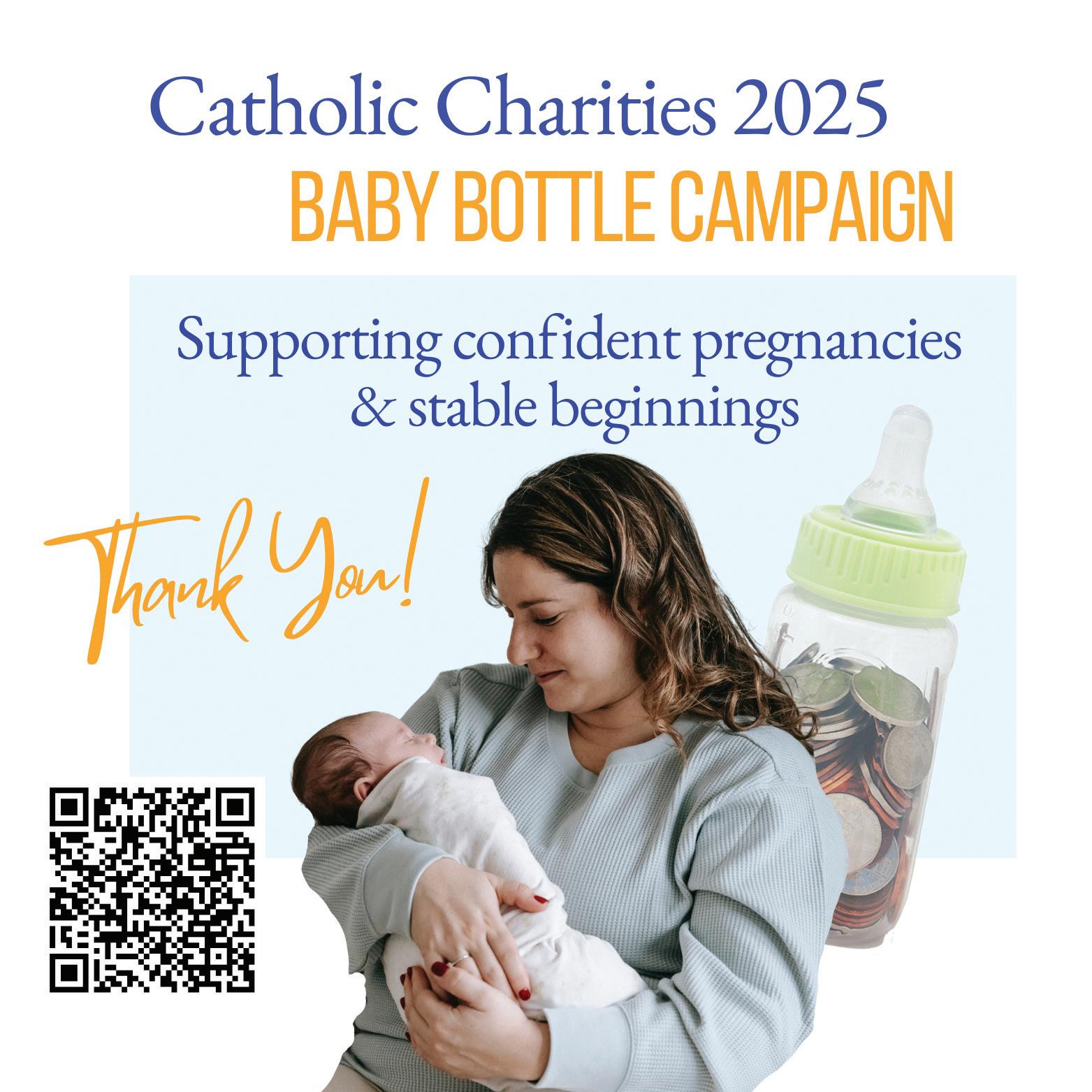
can donate online at www.ccsomn.org/donate, and can designate “Baby Bottle Campaign” or by scanning the QR code. Each contribution can change the life of a mother, a baby, and an entire family.
Sarah Vetter is the director of child and family services for Catholic Charities of Southern Minnesota.
USCCB Releases Statement for Respect Life Month
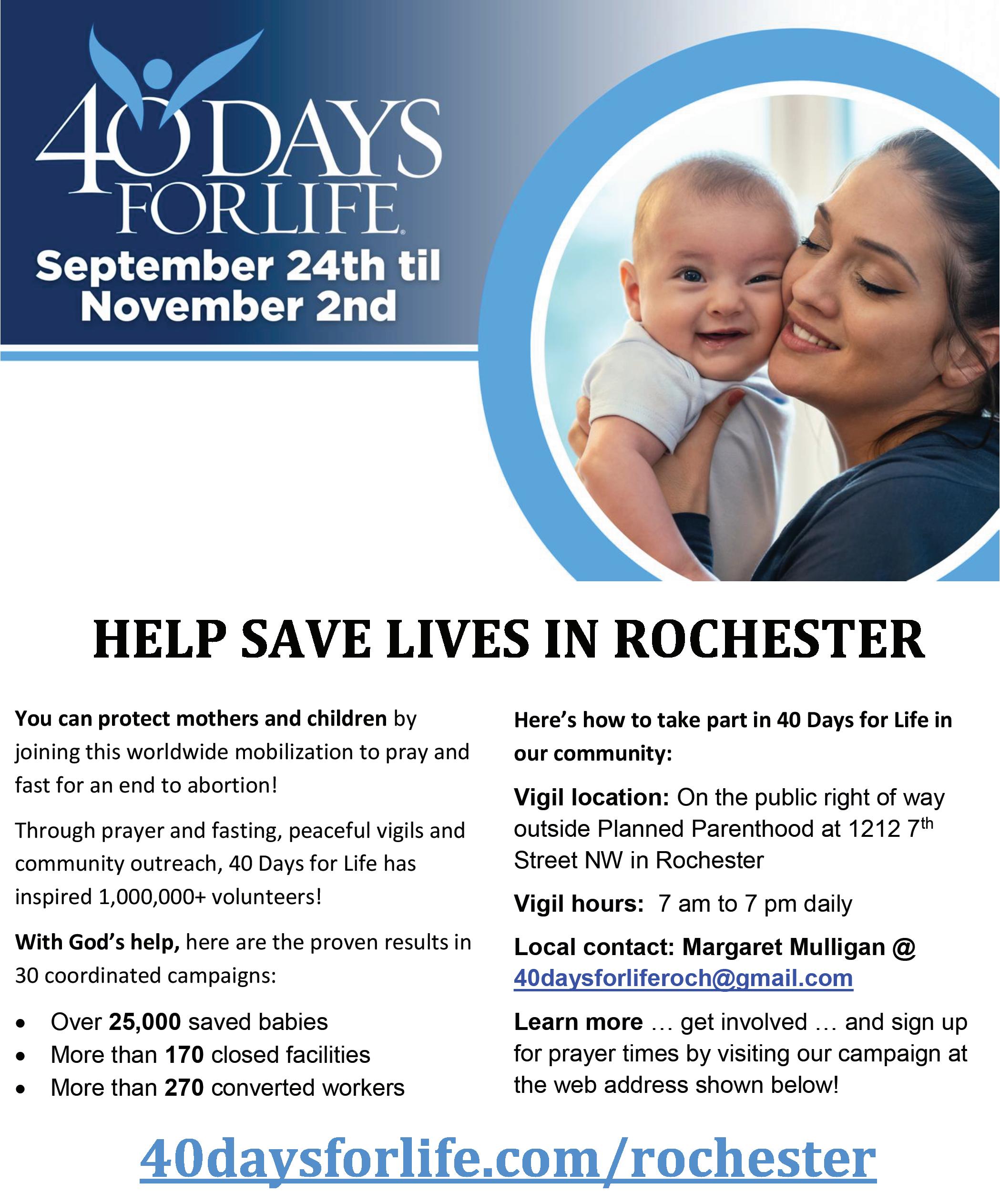
The following statement comes from the MOST REV. DANIEL E. THOMAS, chairman of the Committee on ProLife Activities for the U.S. Conference of Catholic Bishops.
�ith great joy we celebrate October as Respect Life Month amid the Church’s Jubilee Year of Hope. This Jubilee Year “offers us the opportunity to appreciate anew, and with immense gratitude, the gift of the new life that we have received in Baptism, a life capable of transfiguring death’s drama.” The life, death, and resurrection of our Lord Jesus Christ is the foundation of our hope. Through Christ, our sins are forgiven, death is overcome, and life is victorious.
Yet, the daily headlines remind us of how desperately our world is thirsting for the hope that only God can provide. Every day we witness the overwhelming disregard for human life: through rising rates of abortion and assisted suicide; the killing of innocent school children, even at prayer; the mistreatment of our immigrant sisters and brothers as they endure an environment of aggression; and political and ideological violence inflicted against unsuspecting victims. These attacks threaten life precisely when it is most vulnerable and in need of protection.
Despite these realities, the gift of human life exists as a sign of hope to our world today, defying the powers of darkness and the culture of death. It is
of the utmost importance that we work to ensure that every life, in every stage and circumstance, is protected in law.
Earlier this year, history was made when Planned Parenthood and other big abortion businesses were banned from receiving federal Medicaid dollars for one year. I thank Catholics across the country who have embraced a nationwide call to prayer for the end of all taxpayer funding of abortion centers, and I ask that we continue those prayers throughout the month of October.
This Jubilee Year we are challenged to be agents of hope to those whose hearts are burdened by trial, difficulty, or suffering, offering them the hope that comes from Christ Jesus alone. Walking with Moms in Need and Project Rachel Ministry are just two examples of how the Church continuously reaches out with love, compassion, and mercy to those most in need of a message of hope.
As we begin Respect Life Month, together we embrace the words of Pope Leo XIV, “How important it is that each and every baptized person feel himself or herself called by God to be a sign of hope in the world today.” Each of us is called to be a witness to the Gospel of Life, proclaiming in word and deed the innate goodness and dignity of every human person.
For information on Respect Life Month, visit: respectlife.org
Obituary

Sister Lorraine Doherty, OSF, 88, a Franciscan Sister of the Congregation of Our Lady of Lourdes, Rochester, died at Assisi Heights on Saturday, August 30, 2025.
Lorraine Ann Doherty was born on December 14, 1936, in Rochester, to Raymond and Marie (Teigen) Doherty. She entered the Sisters of St. Francis in 1955 and made perpetual vows in 1960.
Sister Lorraine Doherty devoted many years to ministry in education and parish service. She began teaching in 1957 at St. Peter School in North St. Paul, and continued at Sacred Heart School in Norfolk, NE (1961–65), St. Mary School in Owatonna (1965–72), Our Lady of Mt. Carmel School in Easton (1972-73), and St. Mary School in Winona (1973–74). She then served in religious education, various parish roles, and prayer ministry at St. Joseph Parish in Grand Junction, CO (1974–75). From 1997 to 2008, she was an educational assistant at Crucifixion Parish in La Crescent. From 201122, she spent her final years of ministry serving as a sacristy volunteer and in prayer ministry at Assisi Heights in Rochester.
Survivors of Sister Lorraine Doherty include her Franciscan Sisters, with whom she shared life for 70 years; sister Helen Van Lith; and many nieces and nephews. She was preceded in death by her parents; and her brother, Bernard Doherty.
A Resurrection Liturgy was held at Assisi Heights on Wednesday, September 3, 2025, followed by burial at Calvary Cemetery.
Online condolences are welcome at www.mackenfuneralhome.com.
Memorials are suggested to the Sisters of St. Francis, Office of Mission Advancement, Assisi Heights, 1001 14th St. NW, Rochester, MN 55901.
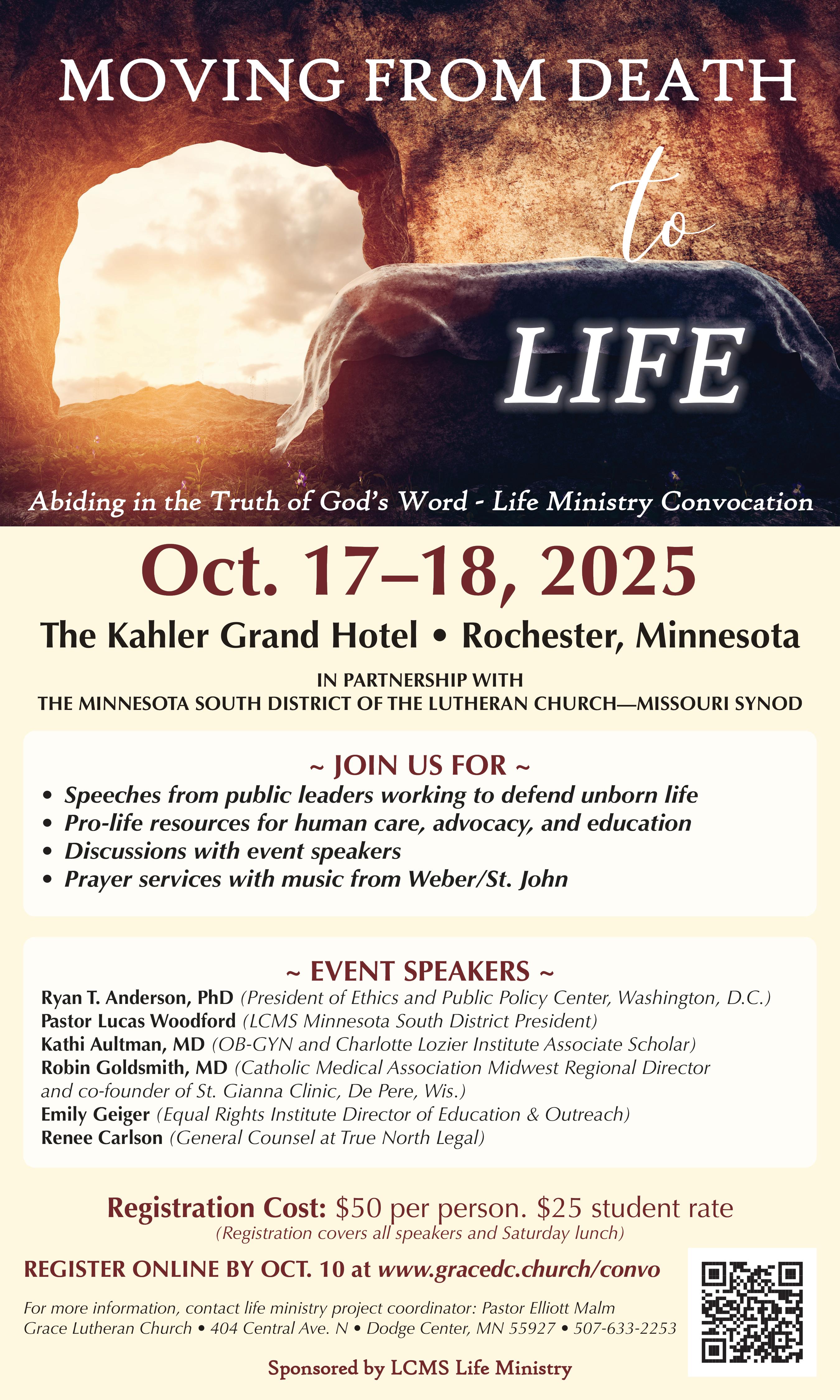
Parish Events
October 5, Sunday
St. Francis of Assisi Parish, Rochester, will hold its Fall Festival from 9 a.m. - 3 p.m. in the school gym (318 11th Ave SE in Rochester). Fun, food and fellowship! Cash prize raffle, silent auction and stretch raffle. Get an early start on Christmas shopping! Food served throughout the day, including Hispanic food and a turkey dinner catered by the Canadian Honker. Kids' games, the "Balloon Man," ring toss, wine toss, entertainment, and a Country Store with baked goods and breads from Great Harvest. Come support a parish that supports the greater Rochester community through multiple outreach programs!
October 11, Saturday
St. Peter Parish, Hokah, will serve its annual roast beef dinner from 3:307:30 p.m. Buffet style or carry out, with famous homemade dressing and all the trimmings! $17 adult (dining room or carry out), $10 kids 6-12, free 5 & younger (kid prices for dining room only). Tickets sold at the door only.
October 12, Sunday
St. Columban Parish, Preston, will serve its annual pork dinner from 11 a.m. - 1 p.m. or until gone. Natural pork loin, real mashed potatoes, gravy, dressing, corn, coleslaw, applesauce, buns and pie. $15 per dinner. Carry-outs only. 408 Preston St. NW in Preston.
Ss. Peter & Paul Parish, Mankato, will hold its Fall Festival from 10:30 a.m. - 3 p.m. in Jesuit Hall. Picnic-style food, including hamburgers, hot dogs, brats and sides, served until 2:30 p.m. Event also features $5 raffle tickets, silent auction, cake walk, A-to-Z jar sale, fresh produce, quilts, face painting, and purse & jewelry booth.
October 26, Sunday
St. Mary Parish, Caledonia, will hold its 59th Annual Holiday Bazaar at 11 a.m. at the school (308 E South St. in Caledonia). Roast beef dinner served 11 a.m. to 1 p.m. or until gone, in Holy Family Hall. Roast beef, mashed potatoes, gravy, corn, dinner roll, dessert & beverage. Adults $15. Kids 12 & younger $10. Dine in or carry out. Live and silent auctions in the school gym, with live auction beginning at 2 p.m. Big Ticket Raffle drawn at 4 p.m.($20 per ticket), for $5,000 grand prize, $2,500 second, $1,000 third, $500 4-16th, and $100 17-30th. Event also features kids' games, chance tables, sweet shop, stage raffle, snack walk and luncheon.
November 2, Sunday
St. Agnes Parish, Kellogg, will host its Drive Thru Fall Turkey Dinner & Raffles 11 a.m. - 1:30 p.m. or until gone. Yum! Turkey dinner with all the trimmings. Served in the Parish Hall, 128 E Belvidere Ave in Kellogg. Event includes a country store and bake sale. Parking lot behind the church.
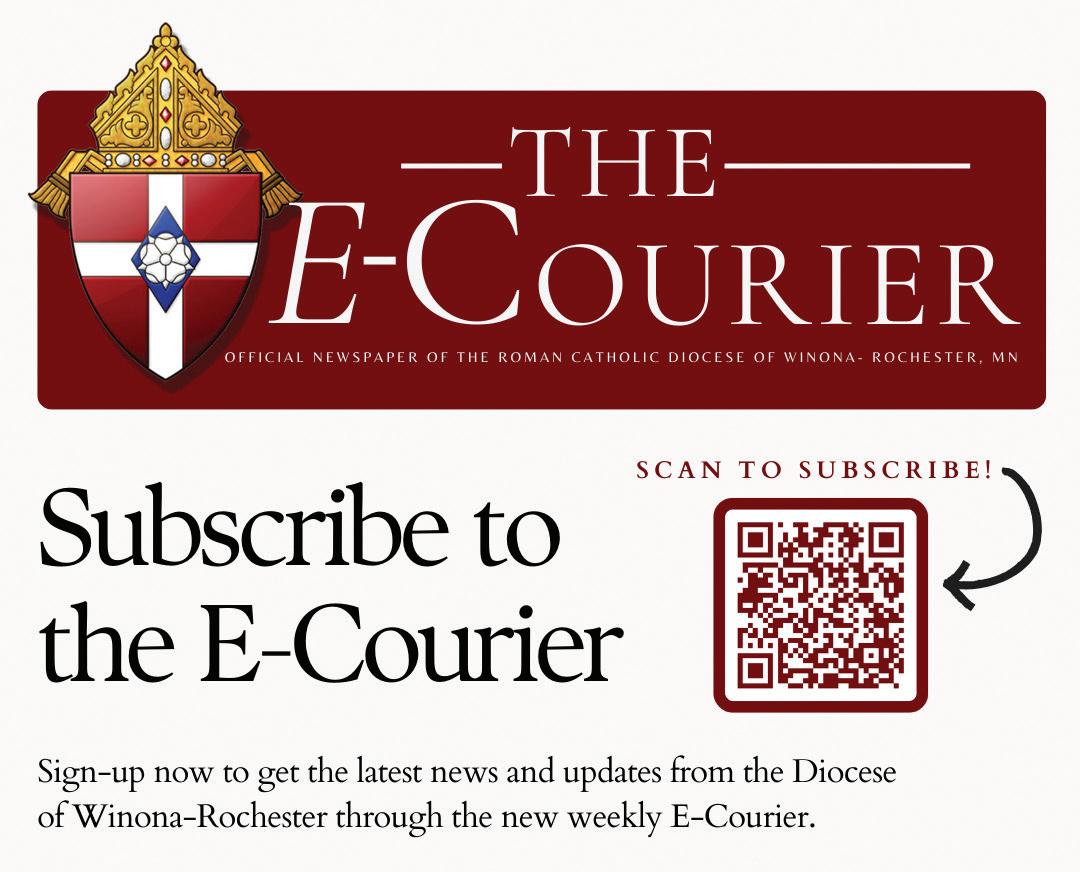
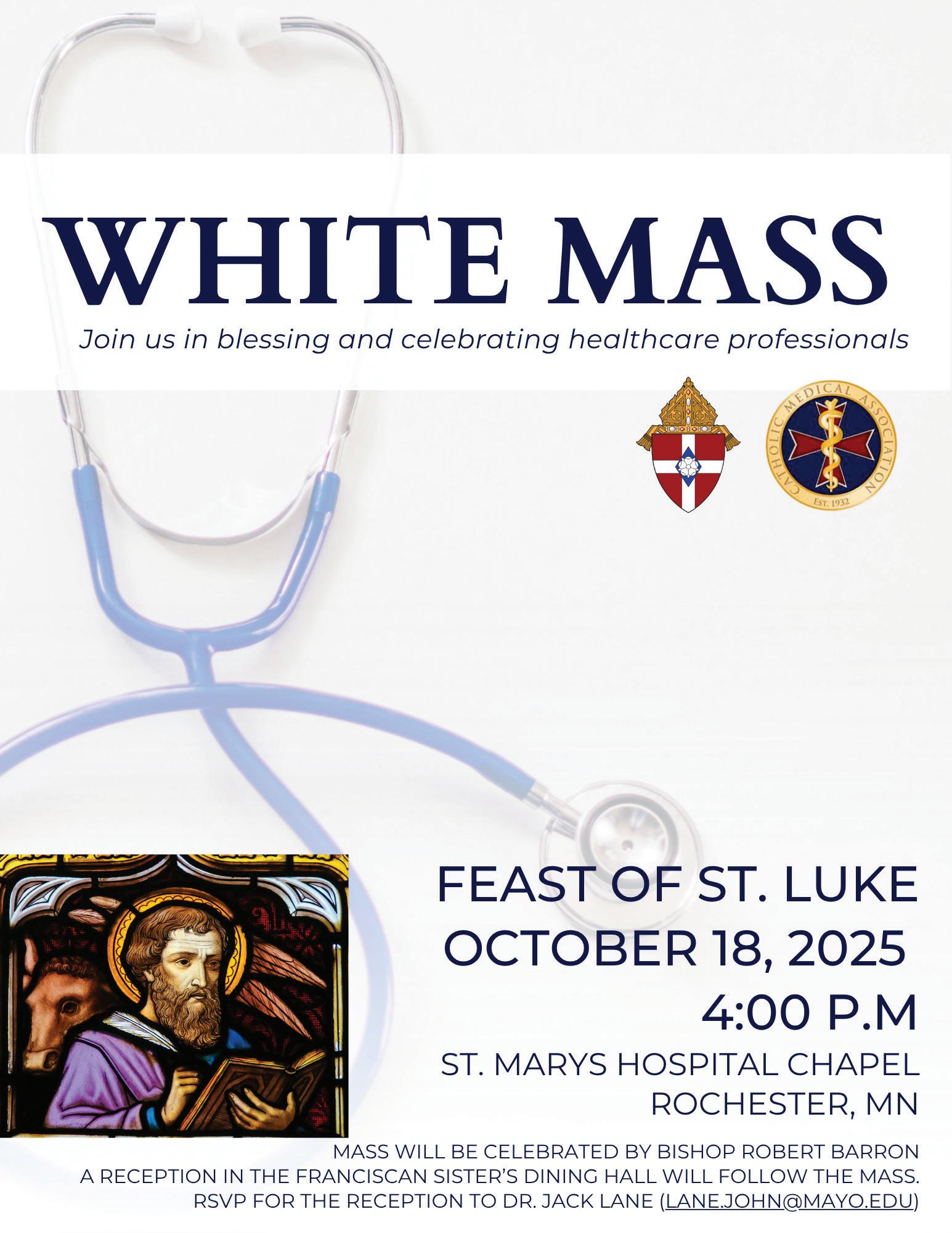

The Televised Mass Is Offered Every Sunday
Sioux Falls - ODLT Channel 7 at 7 a.m.
Mankato - KEYC Channel 12 at 7:30 a.m.
Digital Channel 12.2 or Charter Channel 19 NEYC at 9:30 a.m.
Digital Channel 7 (DirecTV) or Channel 11 (DISH) KMNF at 9 a.m.
Rochester/Austin/Mason City
KIMT Channel 3 at 7:30 a.m.
MyTV 3.2 at 9 a.m.
Twin Cities - WFTC Digital Channel 29 or Channel 9.2 at 11:30 a.m.
Southeastern MN - HBC Channel 20 at 3 p.m. (repeated Wed. at 3:30 p.m.)
Winona/La Crosse/Eau Claire - WLAX/WEUX Channel 25/48 at 7:30 a.m.
and on our website, dowr.org (click "Weekly Mass")


